
Class of 2024! Congratulations,


Class of 2024! Congratulations,
A f er three years around the Harkness table, I can con f dently say that I’ve grown as a student, as a friend and as a leader. Exeter was formative and unforgettable, and I’m so grateful for my time here.
—Thomas Leopold ’
24

You made the diference.
Thanks to your support, students like Thomas fourish in a community defned by active listening and academic excellence. Your gift to The Exeter Fund helps make that kind of transformative experience possible.
Principal William K. Rawson ’71; P’08
Director of Communications
Robin Giampa
Editor
Jennifer Wagner
Contributing Editor
Patrick Garrity
Class Notes Editor
Cathy Webber
Staf Writer
Sarah Pruitt ’95
Production Coordinator
Ben Harriton
Designers
Rachel Dlugos
David Nelson
Jacqueline Trimmer
Photography Editor
Christian Harrison
Communications
Advisory Committee
Daniel G. Brown ’82, Robert C. Burtman ’74, Dorinda Elliott ’76, Alison Freeland ’72, Keith Johnson ’52, Yvonne M. Lopez ’93
Trustees
President
Kristyn A. (McLeod) Van Ostern ’96
Vice President
Suzi Kwon Cohen ’88
Bradford Briner ’95, Samuel J. “Sam” Brown ’92, Elizabeth A. “Betsy” Fleming ’86, Scott S.W. Hahn ’90, Ira D. Helfand, M.D. ’67, Paulina L. Jerez ’91, Giles “Gil” Kemp ’68, Eric A. Logan ’92, Eugene “Gene” Lynch ’79, Cornelia “Cia” Buckley Marakovits ’83, William K. Rawson ’71, Christine M. Robson Weaver ’99, Genisha Saverimuthu ’02, Michael J. Schmidtberger ’78, Peter M. Scocimara ’82, Sanjay K. Shetty, M.D. ’92, Leroy Sims, M.D. ’97, Rhoda K. Tamakloe ’01, Belinda A. Tate ’90, Janney Wilson ’83
The Exeter Bulletin
(ISSN No. 0195-0207) is published four times each year: fall, winter, spring and summer, by Phillips Exeter Academy 20 Main Street, Exeter NH 03833-2460 Telephone 603-772-4311
Periodicals postage paid at Exeter, NH, and at additional mailing ofices. Printed in the USA by Cummings Printing.
The Exeter Bulletin is sent free of charge to alumni, parents, grandparents, friends and educational institutions by Phillips Exeter Academy, Exeter, NH.
Communications may be addressed to the editor; email bulletin@exeter.edu.
Copyright 2024 by the Trustees of Phillips Exeter Academy.
ISSN-0195-0207
Postmasters:
Send address changes to:
Phillips Exeter Academy
Records Ofice
20 Main Street
Exeter, NH 03833-2460


“LET US UTILIZE OUR IMMENSE CURIOSITY AND ABILITY TO ENVISION AND CREATE A BETTER WORLD. ”
—page 34





Austin DeSisto ’24 has documented many moments of his Exeter experience through the lens of his camera, but photographing the aurora borealis in May was extra special. “Night fell and my phone blew up as everyone started frantically trying to see the aurora after check-in,” DeSisto recalls. “I was of campus as a day student, but I bolted back to campus, set up my camera on an empty street, and captured the incredible color over our Academy Building. Talking with strangers about what we were witnessing will forever be the best part of that night.”
DeSisto is headed to the University of Maryland, where he will run track and study journalism — and, no doubt, snap more amazing pictures.


I knew, admired and — I can say in retrospect, in the New Testament language that was dear to him — loved Paul Klebnikov ’81. (Although I must still ask his soul and his family to forgive me for biting his fnger at a bachelor party in Times Square.) My brother Ashok ’81 and I saw Paul, his wife, Musa, and their beautiful children at their beach cabin on Long Island a few days before he left for Moscow for the last time. His passion for Russia’s democratic potential was a burning fame. So I was delighted to read Sarah Pruitt’s excellent article about Paul and about Exeter’s lecture series honoring his memory.
But as one who struggled with the disciplinary system the Academy had in the early 1980s, I think the Bulletin should note that Paul was required to withdraw during his senior year, when he was president of the Student Council. Many good people have gotten kicked out of Exeter and gone on to lead exemplary lives, as Paul did. His memory is an everlasting inspiration and proof that you can land on your feet after a stumble. (For the record, I graduated, thanks to the indulgence of Harvard Knowles, Janet Kehl, Lewis Hitzrot, Henry James, Richard Kazarian and other merciful teachers!)
—Jai Chandrasekhar ’83
The Exeter Bulletin welcomes story ideas and letters related to articles published in recent issues. Please send your remarks to the editor for consideration at jwagner@exeter.edu or Phillips Exeter Academy, The Exeter Bulletin, 20 Main Street, Exeter, NH 03833.

Sam Brown entered Exeter as a lower from Newton, Massachusetts. He lived in Webster North and his activities included winter track, lacrosse, spring track, Glee Club, Exeter Student Service Organization and a term in Cuernavaca, Mexico. He earned his A.B. from Harvard University. He is the president of flm and television production at STX Entertainment. Previously he was a development executive with New Line Cinema, last serving as senior vice president of production. During his career, Brown has overseen the production of more than 50 flms. In 2009, he was selected for The Hollywood Reporter’s Next Gen list of distinguished entertainment executives 35 and under. He recently ended a term as chairman of the board of Young Storytellers, a Los Angeles-based nonproft. He is the president of Exeter’s General Alumni Association.

Gene Lynch entered the Academy as a prep from Chicago, Illinois. He lived in Cilley Hall, where he served as a dorm proctor. He participated in The Exonian, Student Council and crew, serving as captain of the team as a senior. Lynch earned his A.B. in economics with honors from Harvard University and his MBA from the Stanford Graduate School of Business. He is director, partner investments at General Atlantic LLC. Previously, he was an executive director at Quadrangle Group, responsible for developing the frm’s asset management business on behalf of its founding client, Michael Bloomberg, the New York City mayor at the time, and his philanthropic foundation. Lynch is co-vice president of the General Alumni Association, has served in numerous class volunteer positions including class agent, major gift chair and reunion planning member. He and two of his children participated in the 2005 tsunami relief non sibi service trip to Thailand. Lynch also serves as a trustee of the Rye YMCA in New York.
Genisha Saverimuthu came to Exeter from California and was a four-year resident of Merrill Hall. While at the Academy, she participated in the Student Council, Concert Choir, a cappella, and the study abroad program in Mexico. She earned her B.S. in international economics from Georgetown University’s School of Foreign Service and her MBA from Columbia University. Saverimuthu currently leads product strategy and operations at Google, with a focus on growing 1B+, or more than a billion, user products (search, maps, Gemini, payments) in emerging markets. Previously, she worked in McKinsey’s media and technology practice in New York City and held executive and leadership roles at Buzzfeed and The Washington Post. A second-generation Sri Lankan, she spent her undergraduate years teaching and working at the U.S. embassy in Sri Lanka and is the co-founder of a nonproft organization providing technology access to children afected by war. Saverimuthu is the former vice president of Exeter’s General Alumni Association (GAA trustee from 2020 to 2022), helped form Exeter’s female and afnity alumni groups, and has served as an admissions representative, New York Regional Association vice president, class agent and PEA mentor.
Rhoda K. Tamakloe ’01 Sandy Hook, Connecticut


Rhoda Tamakloe entered Exeter as a lower living in Hoyt Hall. She was a dorm proctor and student listener; participated in the Afro-Latinx Exonian Society, The Legacy newsletter, In Essence a cappella group, choir, Precision Step team (founding member), MLK Day Planning Committee, soccer and softball; and managed the boys wrestling team. Tamakloe earned her B.A. in chemistry, molecular biology and biochemistry from Wesleyan University and her M.S. Ed. from Purdue University Global. She is senior manager at the PwC Charitable Foundation and in a previous role worked as the director of operations for the Kaplan Educational Foundation. She is a board member of StartingBloc and an admissions interviewer for Wesleyan. Tamakloe is co-vice president of Exeter’s General Alumni Association, chair of the Alumni Afnity Engagement Committee, an Awards Committee member, an admissions representative and a mentor, and flls many other volunteer roles. E
Students and colleagues paid tribute to retiring instructors in the pages of The Exonian. Here we share the parting stories about those faculty members leaving with the distinction of emeriti.
DANA G. BARBIN
Instructor in Physical Education
“I was asked to join the Physical Education Department and run the summer camps,” recalls Instructor in Physical Education Dana Barbin. “It was a two-year position. That was in 1987.”

Little did he know that was the beginning of a 37-year career at the Academy. “Lucky me,” he says. “This has been a great place to have a life, have a career and raise my family.”
Starting at the Academy as a director of Exeter’s hockey summer camp, Barbin also coached football, hockey and baseball from Day 1. After two years, he became athletic
director of the Physical Education Department. He served in that position for nearly a decade, overseeing the department’s rapid growth from 1989 to 1999. Barbin was also a dorm head for a decade.
Over time, he absorbed Exeter’s non sibi spirit, describing it as the most important lesson he learned at the Academy. “When you have a life in education, your frst concern is always the students,” he says.
“I had a colleague who told me, ‘Always keep in mind that every kid you are teaching and coaching is somebody’s daughter or son.’ That was a good education for me as a young faculty member. I’ve tried to go about my life here with that always in mind.”
Baron Masopust ’24 shares this sentiment about Barbin: “He taught me to treat everybody like family. He always treated me like family and has been more than a coach to me. He’s been a mentor, like a father fgure here.”
Another of Barbin’s former players, Bradley Ingersoll ’17, says: “One of the quotes he used to always give us was, ‘See the world.’ It was a reference to keeping your head up on the ice, but I think it applies to life in general as well. Those words have stuck with me.”
Barbin has seen great change since he arrived at Exeter. “When I frst came, the Academy was a really tough place for the kids,” he says. “We were kind of unyielding. If somebody had some struggles academically, they were gone. … Now, we give those students the help they need.”
To the mentees and players he cared for, Barbin was the one who created that change. “Coach Barbin, your retirement is truly the end of an era at the Academy, and a great one,” Eddie Caron ’01 says. “You have been the greatest coach, mentor and now friend to generations of Exonians. I refect today with a warm heart on every Vet skate, our 1999 New England championship, and the countless lessons you taught me. Most of all, I am grateful to know we will never lose touch and that you will always be there for all of us, no matter where retirement takes you.”
— Sam Altman ’26, Jinmin Lee ’26, Hanna Wei ’27 and Forrest Zeng ’26
Instructor in English
Appointed in 1996, Instructor in English Michelle Dionne spent 28 years teaching the craft of language and literature at the Academy. She also served as a coach for the girls tennis and hockey teams, a dorm faculty in Langdell Hall, the dorm head in Dow House, as well as the dorm head in Browning

House (now Front Street dorm). In addition, Dionne spent time on the Community Conduct and Academic Advising Committees.
Dionne taught at a boarding school in Connecticut and at the Horace Mann School in New York for about 10 years before she found her true home and teaching environment at the Academy. “The Harkness pedagogy is what makes Exeter so unique,” she says. “The table is where we learn to listen. When you learn to listen to people around the table, what you think you understand, those preconceived notions, get blown away and then you feel a kind of joy in understanding something more deeply. … I think that’s something we are so fortunate to have at Exeter is that people are excited about learning. … There hasn’t been a day where I haven’t been touched by that enthusiasm.”
Dionne’s students agree on the efect of her ability to foster thought-provoking and comfortable Harkness discussions. “Ms. Dionne is always patient and supportive in the classroom,” Oscar Zhu ’27 says. “In discussions, she is willing to slow down the pace to make sure that everyone is caught up with the topics.”
Dionne introduced Thea Vaughan ’27 to Harkness at Exeter. “I think we all appreciated her so much and so we all bonded over that,” Vaughan says. “She was good at helping smooth entry into all Harkness classes, which I am so grateful for.”
Dionne’s support for her students has extended past the Harkness table as she taught them the essentials of composition through personal narratives and essays. Sophie Morrow ’27 shares that “not only is Ms. Dionne very good at starting great Harkness discussions, but she is also extremely helpful when editing essays and papers.”
“Ms. Dionne is one of the greats,” Instructor in English Brooks Moriarty says. “She is like a Harkness Zen spiritual guide. She understands how to empower student voices, both in writing and at the table.”
Outside the classroom, Dionne uplifts the community
with her infectious positivity and kind nature. “I’ve never seen her without a smile,” Anna Lane ’12 says. “She is a source of support to students, whether she teaches them or not.”
“One of my favorite things about her is how she maintains a total level head through all of her work,” Moriarty adds. “She’s so steady. She’s been a great mentor to a lot of people in the English Department, and we are going to miss her dearly, but she has left her mark because we have all learned so much from her.”
Angela He ’27, Alex Lim ’27 and Jade Yoo ’27
Mark Hiza, who has served as an instructor in physics and chemistry at the Academy since 1993, has retired, leaving a signifcant legacy of academic excellence that has deeply afected students and faculty. During his time here, he also coached boys JV hockey and track, served as Webster dorm head and was an adviser to many students.
As a teacher, Hiza has an unwavering dedication to pedagogy and support for every student. “Mr. Hiza is very bright,” Instructor in Science Chris Matlack notes. “He can challenge our best students, and the fact that he was teaching chemistry at the highest level makes his retirement a tremendous loss.”
Ben Soriano ’25 shares: “Mr. Hiza has impacted my PEA experience by being a teacher I can rely on to be objective and just in his teaching. His openness to simply greeting me along the paths and asking about my day has helped me feel welcome at the Academy.”
Tifany Sun ’26 agrees, “Mr. Hiza has played an important role throughout my time at PEA. His rigorous teaching

style made me a more disciplined student and helped me learn important skills for my next two years at Exeter.”
Matlack, a long-standing community member himself, has been working alongside Hiza since he arrived in 1993. Together, they coached the JV boys hockey team. “Hiza was also very instrumental in planning Phelps Science Center,” Matlack says. “He was very involved in designing the spaces and getting partners. He has also shown so much dedication to the school by coaching two sports, teaching, being well versed in two departments, and even being a dorm head.”
Caroline Matule ’19 says: “Physics was one of the courses I struggled with most during my time at Exeter. If it wasn’t for Mr. Hiza’s perpetual kindness and patience as I worked through the material, I’m not sure I would have survived the subject. But with his help, I was able to learn so much and even enjoy myself along the way.”
In turn, Hiza appreciates his students. “Many students here go far beyond the regular high school curriculum, especially in math and science,” he says. “I feel lucky to have worked at a school where, 15 years ago, some students asked me to help them learn thermodynamics. I really enjoyed developing and teaching that course. In the frst few years of ofering it, I was learning the subject with my students. My students would still teach me things about mathematics even when I fnally gained a solid grasp of statistical thermodynamics in recent years. I am very grateful to them — they helped me to continue being a student, which I’ve always enjoyed.”
— Carly Canseco ’27, William Inoue ’27 and Sophie Zhu ’27
Woodbrige Odlin Professor in English and Instructor in English
Her team gathers around, waiting to hear her wise advice before a race. Eight rowers and a coxswain, matching in red-and-black uniforms and white visors, listen to every word. They picture themselves fying down the 1,500-meter course, ahead of all the other boats. With the support of their coach, Ms. Moore, they know that they will have the attention, technique and strength to succeed.
Instructor in English Becky Moore has been a vital member of the Exeter community for 34 years. She has served as an instructor in English, crew coach, dorm head and department chair, and was a founding faculty member of the Exeter Humanities Institute.
Before coming to Exeter, Moore taught English, coached crew and lived in a dorm at Choate Rosemary Hall. After that, she attended graduate school, raised her family and worked part time at Exeter, teaching English and coaching JV crew, while commuting from Brooks School, where her husband worked. In 1994, Moore became a full-time faculty member and taught at the School Year Abroad program in France for a year. When she came back to Exeter, she moved with her family into McConnell Hall.

Moore says that one challenge she faced during her early years was the balance between family and work. “The school has a day care center, and that’s huge,” she says. “It was much smaller when we frst got here, but it was one of the reasons I could stay. The balance has gotten better since I came.”
A friend, Instructor in English Jane Cadwell, shares: “Becky was instrumental in developing the Humanities Institute, which is now internationally known for teaching the Harkness pedagogy by having teachers become the students at the table rather than being idle teachers being told what to do. This is something unique in professional development. Becky has also been the standard-bearer for gender equality in our department — always reminding us to be vigilant when we choose books and invite speakers and writers to work with our students.”
Alex Myers ’96, Moore’s faculty mentee, expresses his appreciation, saying: “Becky brings passion and excitement, even to things she has done over and over again. She also has a strong set of values and advocates for those values, even when she knows they are unpopular ... and at the same time she is open-minded. I think that’s a rare thing and extremely valuable.”
Former student Michelle Kwock ’95 says: “Ms. Moore is one of the most memorable teachers I’ve met at Exeter. Her writing assignments were always challenging and pushed me to have the discipline of writing more concisely with less meaningless fuf. My most difcult English assignment was to write a short descriptive piece with only single-syllable words, and it seems like her challenging assignments haven’t changed much over the years.”
Moore will be missed by many. “When I think of Becky at Exeter,” Cadwell refects, “I see her out my classroom window riding down the hill to Phillips Hall on her green

bicycle, skirt futtering behind her. I will miss her steady presence, her respect for institutional memory, her loud laugh that travels the length of Phillips Hall, her resilience, and her willingness to stand up for her beliefs.”
Sam Altman ’26, Allegra Lai ’26, Jinmin Lee ’26 and Lily Rampe ’26
After 37 years of incredible service and commitment, Dean of Students Russell Weatherspoon retired at the end of the school year. His wife, Jacquelyn “Jackie” Weatherspoon, retired alongside him, concluding a brilliant career in global activism and politics.
With their departure, the Weatherspoons have left an unforgettable mark on thousands of students and faculty.
“Dean Weatherspoon and Mrs. Weatherspoon bring a wonderful combination of joy and wisdom to all they do,”
Principal Bill Rawson ’71 says. “The perspectives they share based on their years of experience deepen every conversation. Their humor and goodwill lighten every interaction. Time spent with the Weatherspoons is time well spent.”
On campus, Weatherspoon stood out for his calm, relaxed demeanor, even in times of difcult decisions.
“Working alongside him, I’ve learned patience and moderation,” Dean of Health and Wellness Johnny Grifth says. “I’ve learned how to take things slowly and deliberately, calmly and steadily.”
Weatherspoon was especially adept at forming close bonds with the student body, says Luca Shakoori ’24, one of his advisees. “From a leadership perspective, what makes
him so efective is that he likes to spend time with students,’ Shakoori says. “That feeling of camaraderie helps him lead efectively in more serious moments.”
Students and faculty alike adore Weatherspoon’s subtle humor and swagger. “He’s willing to have fun,” advisee Aidan Ting ’24 says. “During assembly, he’s seen as the ‘cool dean.’ He sings and doesn’t take himself super seriously. That’s a nice presence to have on campus.”
Francis Lee ’15 recalls, “Dean Weatherspoon was a rock in Soule Hall’s life while I was there — the ever-wise and ever-present force of humor and stability, yet still one who was graceful in the way he herded us back to the pack when we’d strayed too far.”
Refecting on her time at the Academy, Elizabeth Closmore ’01 says: “Dean and Mrs. Weatherspoon were more than just fxtures of the campus; they were the heart of the Exeter community. As they move on to a well-deserved retirement, I am flled with gratitude. Their legacy of kindness, guidance and open doors profoundly shaped not just my Exeter experience, but that of countless other students. The Weatherspoons have been a quintessential part of the Exeter experience for decades — what a run! Thank you, Dean and Mrs. Weatherspoon, for everything. Here’s to a retirement flled with joy, health and precious family moments.” E
Erin Han ’26, Adelle Pitts ’27 and Forrest Zeng ’26
Editor’s note: The stories excerpted here originally appeared in the June 2, 2024, edition of The Exonian. Read the entire article about all retiring faculty at theexonian.com.

When Charlie Scales ’24 looks back on his four years at Exeter, four nights sleeping on the ground in Vermont will take up a prominent space in his memory.
Scales, from Asheville, North Carolina, spent late April in the woods, attending a primitive bow-building workshop in which he crafted a working bow from a stave of Osage orange tree wood. The work required long hours peeling bark of the stave with a dull draw knife and a wood-shaping rasp, toil that flled his dreams with the relentless scraping sound of rasp on hardwood. An easy A it was not.
The bow-making class was part of Scales’ independent study project. The program allows Exeter seniors to develop their own curriculum to study areas of interest that fall outside traditional course descriptions. Interested seniors, with approval from the faculty, design individual or joint projects of comparable value and scope to those of an academic course.
Scales is drawn to indigenous cultures and their symbiotic connection with the land. He spent spring term researching the historical Wabanaki, a confederation of fve eastern Algonquin nations stretching from modern-day New York state to Newfoundland. He studied the Wabanaki worldview and culture and their deep-seated relationship with the place in which they lived.
Scales read about subsistence methods, which included farming, advanced horticulture and hunting, all with a goal of developing a deeper understanding of the way people lived in the region ever since the glaciers retreated 12,000 years ago. His capstone was a bow-building workshop, which he attended with his faculty mentor, English Instructor Jason BreMiller.
Yes, he has fung arrows with his bow. No, he has not hunted with it. E
Oliver Liu — “Alchemy in Oncology: Transmuting Chemotherapeutic Waste Into Platinum” Platinum-based chemotherapies are a cornerstone of cancer treatments, with their ability to damage the DNA of cancer cells, and most of the platinum ends up going down the drain. Liu explored multiple chemical processes that would allow for the recovery of waste into metallic platinum, and how to optimize for maximal recovery rates.
William Weber — “Return” Weber developed an album from some of the
500-plus snippets of original music he recorded when he was younger on the voice memo app on his phone.
Natalie Welling and Ava Zhao — ”Shell Shenanigans: Exploring Non-Discrete Game Theory Through the Lens of Hermit Crabs”
Continuing their study of game theory from fall term MAT690, Welling and Zhao investigated game theory and its applications in situations with continuous time and strategy spaces. In the format of stories, some equations and a crab-themed
picture book, the classmates created a blend of computational rigor and beautiful art.
Achyuta Rajaram — “Peel of Fortune: Exploiting K-40 Beta Decay for Quantum Random Number Generation” Rajaram studied radiation as a source of entropy, or true random numbers. He designed and fabricated a detector for low-energy beta radiation and used signal processing techniques to turn the raw data into a usable source of random numbers.
This spring, 67 seniors each submitted a short list of books to recommend to other readers as part of the library’s annual Senior Bookmark program. The colorful bookmarks featured enticing titles — including “I Paused My Game to Read These,” “Grey Morals, Grey Skies” and “Metamorphosis” — and were prominently displayed in Rockefeller Hall in the Class of 1945 Library.
“I had to get creative to put all the bookmarks out because we had way more students this year than usual,” Metadata Librarian Abby Payeur says. “And we make sure we own or purchase all the seniors’ recommendations if we are able. This year, seniors recommended 500 books, 100 of which we don’t own already and will be adding to our circulating collection.”
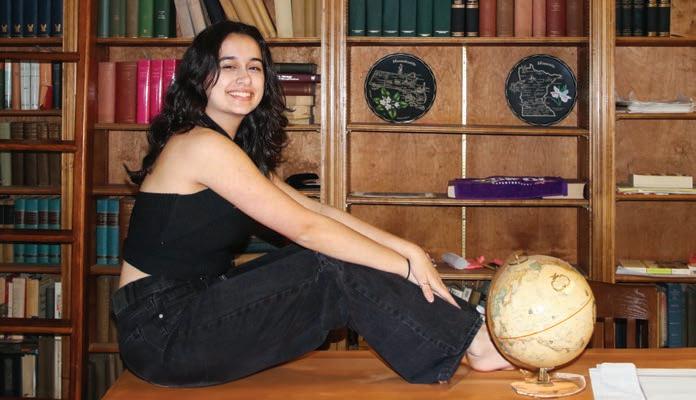
We asked Aliyana Koch-Manzur ’24 to share the inspiration behind the books that made her list, “(This Is What It Means) to Grow.”
“My process for creating the bookmark was simple,” she says. “I sat in front of my bookshelves and wrote down the names of every book that either had a lasting impact on me or simply told a story good enough that I wanted to share it. As I began to narrow down my list, a theme emerged on its own — a theme of growth, of the end of youth, of discovering yourself.
“The bookmark ultimately describes what it means to grow. Some titles, like A Tree Grows in Brooklyn, are quintessential coming-of-age stories that I believe will resonate with everyone. Others, like Imogen, Obviously and The Egg are less universal but are pieces of my personal exploration of identity and faith that I wanted to share. I hope this bookmark is able to convey the messiness of growing up, but also the excitement of discovering who you are and who you want to become.

“I am so grateful to the librarians for creating and maintaining this tradition!” E
Aliyana Koch-Manzur ’24 and her bookmark. Find more bookmarks at: libguides.exeter.edu/ seniorbookmarks.


RELAY FOR LIFE: The community united to raise awareness, celebrate survivors of cancer and remember loved ones lost.

TAKE BACK THE NIGHT: The powerful on-campus event focused on ending sexual, relationship and domestic violence in all forms.

HOLI:
or colorful powders, were tossed in the air as students marked the arrival of spring during the
Arescue mission is underway in the Academy woods. Three hundred American chestnut saplings, dwarfs among towering pines and oaks, are fghting for a footing in the forest, and Exeter students are here for it.
During the school’s Climate Action Day in April, an Exonian work party marched into the woods to check on the chestnut trees, a species nearly eradicated by blight in the early 1900s. The daylong schoolwide event, now in its 10th year, is devoted to service projects and seminars aimed at improving awareness of great and small challenges to the environment. Here are a few highlights from the day.
The Rev. Dr. Abby Mohaupt led an interactive workshop challenging audience members in Thompson Gym to think about their purpose in life and how their actions afect the world around them, including the natural world. “What is nature?” Mohaupt, the director of the Garrett Collective, asked, prompting students to draw pictures of their interpretations. Then she asked, “Now, where do you ft in?”
The threat of nuclear war is “not some 1980s problem we read about in history books — it’s a real and present danger,” Dr. Ira Helfand ’67 told students during a workshop titled “Nuclear War, the Ultimate Climate Catastrophe.” Helfand, a physician, is a member of the international steering group of the International Campaign to Abolish Nuclear Weapons, a recipient of the 2017 Nobel Peace Prize for its work. Helfand has served as an Exeter Trustee since 2020 and advised the school on its sustainability and climate action plan.
Helfand spoke plainly to Exeter students about the devastation that would follow a
nuclear attack. He emphasized that the threat is higher than at previous times in history because of the number of volatile global fashpoints, including Russia’s war in Ukraine and tensions in the Middle East and South Asia.
Despite the sobering message, Helfand remained hopeful. He urged students to fnd small, concrete ways to educate themselves further and increase the political will behind nuclear disarmament. “You had nothing to do with this problem … but the fact of the matter is that it’s your responsibility, too,” Helfand said. “You should really appreciate the power you have to infuence policy.”
From reusing worn-out squeegees to printing new designs on thrifted T-shirts, visiting artist Ryan McGinness is continually fnding creative ways to rework “residue and detritus from the studio.”
Known for paintings, screen prints and installations that include corporate logos, signage and contemporary iconography, McGinness’ work is held in the Museum of Modern Art in New York, the Museum of Contemporary Art San Diego and the Charles Saatchi Collection in London, among other museums and collections.
Aided by Art Department faculty members, McGinness guided students through the screen-printing process, helping them create a collaborative artwork on repurposed screens, using old ink, spatulas and squeegees. The project was inspired by McGinness’ own recycled installation, “Screen Combine #47.” After an initial demonstration, the 12 students in the afternoon workshop donned aprons and broke into pairs to build on the work of their morning counterparts, creating a rich, layered tapestry with a vibrant message of sustainability.
McGinness spent a week on campus visiting art classes thanks to the generosity of the Michael Clark Rockefeller ’56 Visiting Artists Fund. E
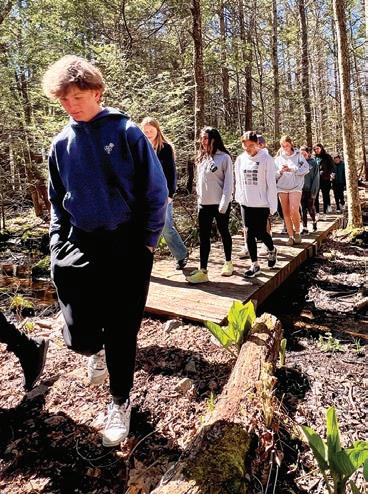

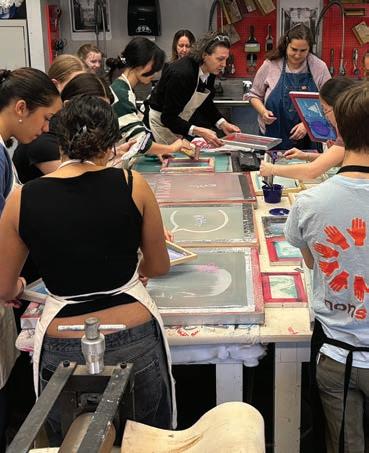

Why are some people able to learn anything faster? Would you want to become one of them?
The world is now, more than ever, pulsating with information. Knowledge, one of the most powerful forms of currency, is free for the taking. However, the skill sets we need and the productive output required of us is also nothing like that of the previous generations. To keep up with the masses and even excel, we need to learn faster than ever before. The ability to learn faster is a mystery that many have attempted to crack. As we stand on the brink of a new era, the fusion of biology and technology gives great opportunities for accelerated acquisition of knowledge. In order to optimize learning, an understanding of what learning is through a neurobiological lens would provide great insight. Any form of learning comes from the brain, more specifcally, the strengthening or weakening of electrochemical signals between our neurons (a type of brain cell). The connections between neurons are known as synapses. And the changes in the strength of electrochemical signals between synapses is called synaptic plasticity.
Synaptic plasticity is the basis of learning and memory. Synaptic plasticity is a dynamic and adaptive process that allows the neural circuits in the brain to modify their activity in response to experience. When you are learning a new skill such as serving a volleyball, the neural pathways in your brain will fre and the shape of the neurons in your brain will change, allowing you to strengthen the signals sent to your brain when doing the right movement, and repetitions of the right movements eventually lead you to serve the ball consistently as there is a strong connection between the neurons that fre when you serve a ball.
Therefore, if we want to increase our learning abilities and learn faster, we should try to trigger a more plastic and malleable brain that will be willing to change its pathways in order to learn a new skill. Plasticity has been proven to be controlled by several chemicals in our brains, namely acetylcholine, epinephrine and dopamine. When those chemicals are released, the brain marks the event as “important” and “to edit” while most of the changes to the plasticity and shape of the connection between neurons happens during sleep.
So how do we induce the release of acetylcholine, epinephrine and dopamine in large amounts while learning? Interestingly, the only condition needed
to allow the brain to enter a plastic state is to make errors. Error provides a cue for frontal cortex networks to release those important learning chemicals. The more mistakes you make, the larger the dopamine release will be when you eventually do it right, hence making the brain more plastic and receptive for change and more prone to remember the right action/movement/answer.
Have you ever felt frustration every time you are struggling to learn a form of new knowledge but not getting it right consistently? Well, this happens due to the release of those important learning chemicals, which change the shape and plasticity of your brain. But the brain does not want to change its shape, hence the brain processes this large surge of chemicals as frustration. Every time you are failing to learn something and feeling frustrated, you are releasing chemicals that will make you succeed in learning this skill. In some ways, errors frame the brain to learn and absorb more information when you end up getting it right. The most efcient way to learn a skill fast is to maximize the amount of repetitions and fail as much as possible within a time period. Experiments have found that the brain will end up learning, fguring out and getting closer to the right answer if you have the intent of getting it right.
Another powerful tool is to react to this kind of frustration with happiness and pleasure. When we smile in the face of defeat, stress or struggle, we trick the brain to release dopamine (the neurotransmitter that guides pleasure and motivation but also helps in synaptic plasticity). Hence, we condition our brains to release dopamine when we are in the face of struggle and challenge. Next time you end up facing a challenge or having to learn something new, your brain will naturally release more dopamine and allow your brain to learn faster due to increased plasticity.
A third extremely important factor in learning is to allow your brain to absorb the information. After performing any intensive learning, whether it is studying for a test or learning to execute a backfip, taking a break of fve to 10 minutes without engaging your brain with another form of stimulus allows the sequence of information learned to be replayed by your brain, which then selects the series of events in which there is a high release of neurotransmitters. The things you did well repeat and the things you did wrong get cut of, allowing you to acquire and process the information learned faster.
A fast-paced world, a fast-paced school and a fast-paced lifestyle push us to learn everything faster and to execute tasks at high efciency. Fortunately, advances in our understanding of neuroscience allow us to develop behavioral ways to learn and absorb knowledge faster than the average person. Sometimes the diference between two very competent candidates with equal willingness to work is “talent”— an intangible that makes someone a faster learner and better performer. Well, why not try out these newly acquired “talents” of yours? E
Editor’s note: The piece excerpted here originally appeared in the winter/spring 2023-24 edition of MATTER, Exeter’s student-run science magazine. To read more, visit matter_mag on Instagram.
“If we want to increase our learning abilities and learn faster, we should try to trigger a more plastic and malleable brain that will be willing to change its pathways in order to learn a new skill.”

Men on Boats is a semi-true history of an 1869 expedition in which a one-armed captain and his crew of loyal volunteers set out to chart the course of the Colorado River. Inspired by John Wesley Powell’s actual journal entries, this fast-paced, laugh-out-loud script was performed by a cast of non-male actors who infused the production with a sly blast of satire. As Instructor in Theater and Dance Rob Richards, the director, shared with audiences, “We hope you journey along soaking in the incongruities, the joys and sorrows — the immeasurable roars.”
The Theater and Dance Department held a staged reading in May of Something in the Water, with music and lyrics by Interim Director of Choirs Jerome Walker. The story follows three young locals who decide to scare of the wealthy out-of-towners who descend upon Lake Town each summer by pretending that a monster inhabits the lake.
Director Liz Calandra praised the resilience of the student cast and crew for the work in progress. “It is stressful to be constantly changing the script and being a part of the creation of a piece of work, and all of the students have been amazing throughout the process,” she said. “We had to be flexible, communicative and creative.”
Select scenes from the musical were performed at a celebration commemorating five years since the opening of The David E. and Stacey L. Goel Center for Theater and Dance. “The Goel Center,” Theater and Dance Department Chair Lauren Josef says, “has allowed us to expose students to state-of-the-art practices and technologies, to delight audiences with incredible productions … and draw more students than ever to our program.”



Faculty, student and guest choreographers drew inspiration from poetry, novels and other written sources to develop the moving work showcased in the spring dance company performance of “Of the Page.”
The show featured a diverse range of dance styles including contemporary, tap, musical theater jazz, Romantic ballet and modern. A highlight was the dynamic Bollywood fusion piece by guest choreographer Kshitija Saturdekar.

“I am so proud of the work our students and music faculty have done to bring joy and music to our community,” Music Department Chair Marcus Rabb says, reflecting on the past year. “We had nearly 30 concerts, with in-person and virtual audiences in the thousands. We averaged about 450 music lessons per week, and we hosted amazing visiting artists who shared their gifts with our school. I can truly say that things are happening in the Forrestal-Bowld Music Center.”
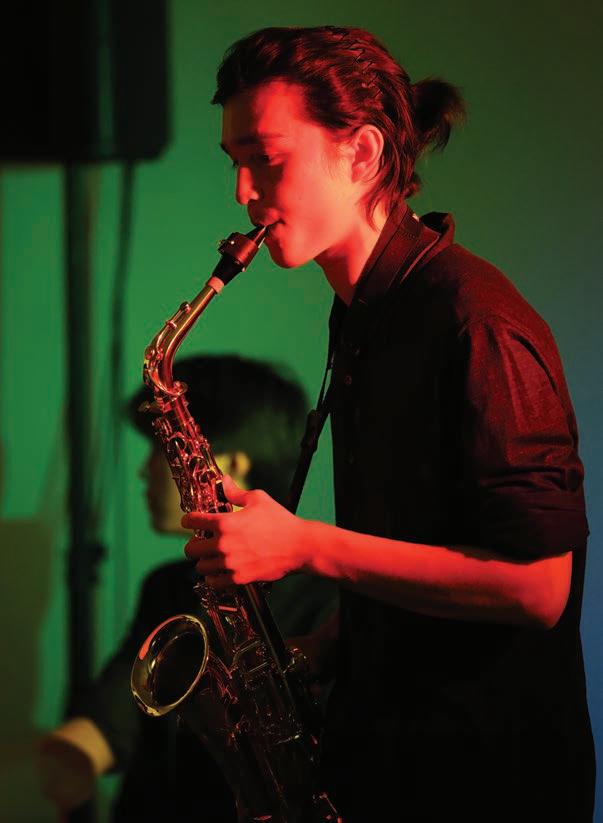
Of the estimated 5 million students who graduated this spring, just 161 were named Presidential Scholars. Pippa P faum’24 was one of them. The Presidential Scholars Program was established in 1964 by President Lyndon B. Johnson to recognize some of the nation’s top-performing high school seniors for their academic success, artistic excellence, technical expertise and commitment to service and leadership.
During her three years at Exeter, P faum was a student representative on the Community Conduct Committee, the head of accounting on The Exonian Business Board, co-head of the Exeter Student Service Organization Microfnance Club and captain of the feld hockey team, among other endeavors.
What was your favorite class?
Physics 500 was a favorite despite being my most challenging class at Exeter. As a STEMfocused student, I’m generally drawn to the kind of thinking and problem-solving physics engages. However, it was my teacher, Mr. DiCarlo, not the subject, that made the class an academic turning point. I learned physics, of course, but I also learned about myself as a learner. I discovered how much curiosity fuels my academic drive and that peeling back layers for discovery is where I tend to shine. Mr. DiCarlo consistently indulged my “why?” queries. He explored tangentially related topics with me, both deepening my understanding of the subject and encouraging me to keep asking, “How high is up?” His class gave me confdence to ask trickier questions and explore new ways of learning, including in other subjects.

had a dual beneft; I learned the subject and I learned how to quickly formulate my ideas then sort out the most efective way to express them. Harkness also enhanced my ability as an efective listener — and highlighted the value in continuing to grow as a listener. The better listener I became, the more I learned and ironically, the more I had to say about or question the subject at hand. All this moved me forward as a student, but it also moved me forward as a more engaged, conscientious and valued community member. Becoming a better listener, thinker and contributor is one of the indelible marks Exeter has left on me.
As a Presidential Scholar, you were ofered the opportunity to honor your most influential teacher with a personal letter from the Secretary of Education. Whom did you name?
How have you grown as a student/person?
Harkness had an outsized impact on me both as a student and more broadly as a community member. Every class
I chose to honor my upper year English teacher, Ms. Dean. This is a bit ironic because I have always felt most comfortable with, got most excited about, and excelled most in math and sciences. However, Ms. Dean’s class shifted how I view myself as a student. She helped me become more comfortable as a writer, pushing me to take risks with both style and content. When she noted I often use humor in my writing, she suggested I explore this with new techniques. She encouraged me to try things like extensive footnotes, switching to second-person narration and (yikes!) using run-on sentences as a stylistic tool. At frst, overhauling my writing style overwhelmed me. The process was tricky and uncomfortable. But after seeing how these techniques let me experiment with my humor, even when writing about something serious, I embraced them. My writing improved, but most importantly, Ms. Dean helped me discover that the joy of creative problem-solving for me is not limited to math and sciences. E
As a student, a dedicated alumni volunteer and a parent to two Exonians, Peter C. Aldrich ’62; P’99, P’03 has made a lasting mark on the Academy over more than six decades. Yet perhaps nowhere was his impact felt more than on Exeter’s buildings and grounds, the responsible maintenance of which he championed as a trustee
advantages I had,” he said.
Inspired by President John F. Kennedy’s challenge to college students to live and work in developing countries, Aldrich established Exeter’s Peace Corps program in 1961. Aldrich served in the Peace Corps in the Philippines after graduating from Harvard. At Harvard Business School, he embraced an entrepreneurial drive, and founded his frst business shortly afterward.
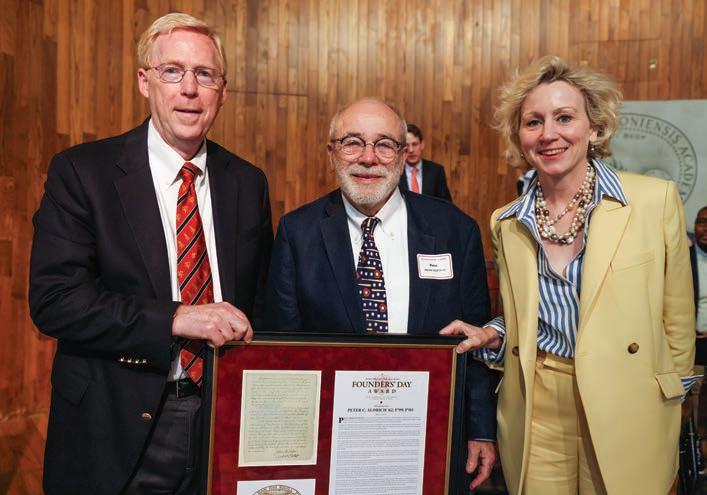
from 1987 to 1997. In recognition of his extraordinary service to the school he loved, Aldrich was presented with the 2024 Founders’ Day Award in May.
“As a trustee, you applied your intellect, curiosity and boundless energy to the vital task of preserving Exeter’s buildings for future generations of students and faculty,” Betsy Fleming ’86, president of the General Alumni Association, said while delivering the award citation in the Assembly Hall.
Conceived by Principal Stephen G. Kurtz and established by the Trustees in 1976, the Founders’ Day Award is given annually by the GAA in recognition of devoted service to the Academy.
In accepting this year’s award, Aldrich spoke of his fortunate upbringing in a large, afuent family in Wellesley, Massachusetts, and his long-standing desire to prove himself worthy of the privilege he had been aforded. “I knew I had to earn the many
Aldrich began his service to Exeter as an alumnus in the 1970s, hosting fundraisers and assisting on the Long Step Forward capital campaign, among other roles. To his position as trustee and chair of the Buildings and Grounds Committee, he brought knowledge drawn from his experiences founding and running businesses such as AEW Capital Management, a successful real estate investment frm.
Fleming emphasized that Aldrich left his mark on the entire campus. “You noted the amount of deferred maintenance on Exeter’s hundreds of buildings, including leaking roofs and crumbling foundations, and helped implement the comprehensive facilities assessment procedure the school uses today,” she said while presenting the award.
Under Aldrich’s guidance, Fleming explained, the Trustees embraced his motto of “no net new space,” meaning that for every new building on campus, an equivalent amount of square footage must be decommissioned. They also ratifed a funding policy for capital projects dictating that money raised for every new building must cover 130% of the cost, ensuring the maintenance of the building in the years to come. Since his time as a trustee, Aldrich has continued his service for Exeter on various reunion committees, the Trustee Council and the 1781 Committee.
Despite his success in business, Aldrich emphasized the number of times he had failed in his career. He used these experiences to ofer words of wisdom to the younger Exonians in the audience. “If you don’t have failures, if you’re just rocketing through life with everything going well, someday you’re going to meet a real crisis and it’ll be hard for you,” he said. “But if you have failed and think about it and try to learn from it, I think you’ll be just fne.” E
SOUND BITES FROM




Andrew Laszlo Jr. ’70; P’00, P’04, Son of a cinematographer and Holocaust survivor
“The last piece of advice [my father’s] father gave him … was to shave every day. Although my father didn’t understand the advice, he followed it faithfully. He shaved at the labor camp, he shaved at [Bergen-Belsen concentration camp]. … Today I understand that shaving every day was a metaphor. When you’re bullied or persecuted, you need to do something to maintain your humanity. If you do, you can be beaten, you can be killed, but you can never be defeated.”
Grant Sanderson, Online content creator, math YouTuber (3Blue1Brown)
“Math done outside of a school environment just feels diferent to a student than when it’s done inside a school environment. … Because sometimes the most fun aspects of math come not from directly beelining towards a solution that you want, but noticing something kind of intriguing and giving yourself the room to ask, ‘What happens if I do this?’”
M.K. Kim ’16, Project manager, photographer, videographer and founder of Made It Happen
“You can’t predict what happens in the world. You can’t react as quickly as you’d like. What’s more important is that you understand that it’s a marathon and not a race. … What people want to see more than anything is you take responsibility for the actions you [take].”
Hansol Jung, Playwright
“Everyone has a weird, or several weirds that make up a diferent kind of weird — the thoughts that set you apart from others, that perhaps at times terrify you. What you care about, what you don’t, how your imagination ignites, how your empathy fares, your set of lived experiences and beliefs … how you see the world and how you exist in it.”
Jon Caramanica, Music critic at The New York Times
“The minute someone tries to encroach upon your independence, listen to that. Try to avoid those places — and I mean that in all aspects of life, but particularly when it comes to journalism and artistic spaces. The thing that you should be craving most is the ability to tell true stories and ofer true perspective, and the minute someone tells you you can’t do that, try to move in another direction.”
Eric Kapitulik, U.S. Marine, ultra-endurance athlete, founder/CEO of The Program


“We should be good friends to each other. But being good friends to each other is never a problem, except when being good friends to each other becomes more important than being great teammates for one another. Be both. Be good friends to each other, but then set the example and hold your teammates accountable to it.” E
M. Rebecca “Becky” Moore moved into Phillips Hall Room 219 in the late 1990s. “It was the frst time since I had begun teaching that I had ‘my own’ room,” she says. For the next 34 years she challenged and taught hundreds of students in this wood-paneled enclave with its well-worn Harkness table, old closet “for the boys to hang their winter coats,” she says, and slate chalkboards that outlasted the building’s renovation (when the room was renumbered PH 205). The space has many stories to tell about her years of teaching and we asked Moore to share a few with us before she retires and the room takes on the life of its next inhabitant.
1. “One of my journal topics each term is to have students write about the painting and what they see in it. Several have said that they think of the passenger as a deceased Civil War soldier.” “Avatar” was painted by Moore’s son Davis H. Moore ’05 and inspired by a nighttime canoe trip with his brother Tim C. Moore ’08.
2. “Initially I drew this conversation diagram — and its partner that reads ‘Everyone a Listener, Everyone a Speaker’ — for teachers in the Exeter Humanities Institute. For the last several years I have kept the diagrams propped up on the board all the time; I hope that they cue students and help visitors understand more fully how Harkness teaching difers from typical American classrooms where teachers speak 70% of the time.”


3.“Sometimes outsiders assume that the English Department never changes its texts. And yet, each year since 1990, I received collections by the year’s Lamont Poets and was invited to teach those collections in preparation for each poet’s visit to campus for an evening reading to the school and larger community. Tyehimba Jess, Natasha Trethewey, Kay Ryan, Eavan Boland, Marilyn Chin, Stephen Dunn, Philip Levine. … The list goes on and on.”





instructor in math and crew coach — gave me this rowing print that had hung in his classroom. I plan to pass it on to Tyler Caldwell, fellow English teacher and rowing coach. Tyler’s mother and I both taught English and shared dorm duty at Choate in the 1980s.”
5.“I find myself increasingly frustrated by student use of phones and earbuds. I see technology as a means of avoiding living in community — the whole reason to come to a boarding school. I have posted signs in the classroom about being more present by setting their phones aside in a basket. I then exhort them not to check their phones until after they leave since I feel sad watching the checking frenzy.”

6.“My first spring season as a crew coach — biology teacher Anne Rankin ’92 was in the third boat — I received a varsity letter from the athletic director. Later, Anne’s daughter Catherine Webber ’21 would become my advisee and also rowed for Exeter.”
To honor their teacher, Meredith Hitchcock ’06 and Sarah Odell ’06 established the M. Rebecca Moore Fund for Women’s Leadership. It will be used at the discretion of the Dean of Faculty to support female-identifying individuals who are interested in professional development and training opportunities for leadership roles. E
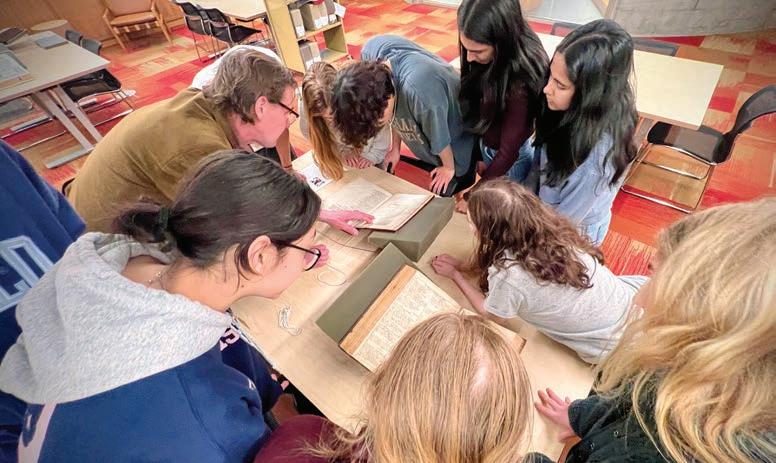


With nearly 400,000 books in its collection, the Class of 1945 Library boasts a trove of literary treasures. But some books stand out.
The library is the grateful steward of two folios of William Shakespeare’s printed works: the second, which dates to 1632, and the fourth, which was published in 1685.
“The story of Shakespeare’s remarkable rise to global prominence begins with his promotion in the 17th century in a series of large, handsome folio volumes,” writes Lara Bovilsky, associate professor of English at the University of Oregon. “‘Folio’ was the name of the largest books in this period. Due to their size, cost and careful printing, folios were the 17th century’s most prestigious format. They marked their author and contents as important.”
The second folio was printed 16 years after Shakespeare’s death. Of the roughly 1,000 copies of the second folio printed, about 200 are still known to exist. Exeter’s edition was a gift of the Rev. Rip Noble ’58, who told The Exeter Bulletin in 2008 that he was inspired to make his generous donation in gratitude to his Academy English teachers “who taught me to love and respect the English language.”
The folio had belonged to Noble’s grandmother. “My grandmother let me pick a book from her collection for every birthday and graduation,” Noble explained. Following Exeter, he went on to Princeton and to Union Theological Seminary. “I picked it when I graduated from seminary. I was thinking of Exeter and those teachers when I selected it.” E
By Daneet Steffens ’82

Rufi Thorpe is on a roll. Her 2014 debut novel, The Girls from Corona Del Mar, was longlisted for the International Dylan Thomas Prize and the Flaherty-Dunnan First Novel Prize. Her 2016 novel, Dear Fang, With Love, was followed in 2020 by The Knockout Queen, a fnalist for the PEN/Faulkner Award. Her latest, Margo’s Got Money Troubles, seems poised to be a summer hit, popping up on must-read lists as well as generating additional buzz: an Apple TV series is in the works with Hollywood stars David E. Kelley, Nicole Kidman, and Elle and Dakota Fanning attached.
Thorpe’s new novel — about a young single mother, Margo, trying to make ends meet — is a thoroughly engaging story about the transformative power of love, art and humor. It’s also jam-packed with wacky characters and charming scenarios, including Margo’s former pro wrestling champion father, Jinx; collegial cosplay sex workers; and a gentle love afair conducted through writing. Canny references to cultural touchstones such as writers Neal Stephenson and William Gibson, viral social media and Lady and the Tramp keep the narrative fun, funny and fowing.
We caught up with Thorpe amid the furry of prepublication commitments.

Who are you addressing in the book’s dedication, “For you”? The reader. We’re all seeking human connection, and novels ofer that. Growing up, books were where I found a place of feeling understood, feeling like there were other humans like me; loneliness was eased by communing with these minds of people that I had never met. That connection has been such a profoundly positive one in my own life, so this is my ode to those spaces.
You’re really good at eliciting human imperfections with empathy across an eclectic range of characters. Is that intentional?
Part of the reason I became a novelist is because I’m wildly in love with people. A subject I come back to over and over again is the impossibility of judgment: What do you do when people do bad things, especially people that you love? I return to that, as well as recognizing the inadequacy or inefectiveness of punishment as a response. I think it’s combined with a sensibility that life either strikes you as funny or tragic, and it strikes me as funny. And people, even in the ways that they’re fawed, strike me as beautiful. I’m interested in moral grayness, that people are not all bad or all good. As a writer, it interests me to try and get that right.
Why did you choose to switch between the first person and third person, sometimes talking directly to the reader?
I’ve always written frst-person but wanted to be the kind of writer who wrote in third person — it just seemed so elegant. At the beginning of this
project, I thought this was going to be the book where I fnally fgured out third person. Then I realized, maybe this is the book where I investigate through the third and frst person, and not one where I try for seamless illusion.
That technique almost becomes a narrative in itself. I’m fascinated with narrative, and so much of this book is about creating your own narrative and persona. For her video work, Margo is creating her character, Hungry Ghost; Jinx has created his wrestling persona; and I, Ruf Thorpe, am putting on the Margo mask by writing in frst person, engaging in that artifce creation. One of my ways into understanding character is impersonation. Both of my parents were actors and I did a lot of theater growing up; I did theater at Exeter.
Were you cast or crew at Exeter?
I worked in theater tech, building sets, and we were given so much freedom and autonomy. That’s where I learned to use power tools, which was a super-empowering skill. I always felt more comfortable with a circular saw than any boyfriend I ever had. I still apply that by refnishing furniture.
What are some other Exeter memories?
Who are your influences as a writer?
A huge thing for me was realizing that I was a comedic writer. John Irving, another Exonian, was a big part of that for me, in terms of understanding the way that humor can act as a leavening agent to allow you to talk about really dark things in a way that’s tolerable. Also, the way he allows his obsessions to recur in diferent forms throughout his novels was a model. It can feel, after your frst novel, like you have to invent a whole new self to write another book, like you’re supposed to do something completely diferent. But really, Irving is writing the same book over and over. He gave me permission to do that, to realize that it was okay for thematic obsessions to recur, as long as I was making them fresh and interesting and exploring new aspects or new combinations of those elements.
“Well, the questions stopped being ‘Am I special? Am I talented? Am I brilliant?’ That freed me artistically and psychologically.”
Exeter was really formative for me. I didn’t graduate — I wanted to do advanced English classes as an upper but wasn’t allowed, so I applied to college early. I did have wonderful English teachers, Nita Pettigrew and Rex McGuinn. They, and theater, were my happiest parts of Exeter. Also I took Russian with Inna Sysevich, the most wonderful, warm, kind, earthy woman I’ve ever known. I chose Russian out of sheer perversity. I liked the idea of learning another alphabet. Because of that, I’ve read a lot of Russian literature and that has had a lasting impact on me. Going to a place like Exeter, you’re thrust into adulthood: You’re navigating airports and layovers at 14, and it makes you feel like a citizen of the world. You’re managing a complex schedule, with lots of homework, and you have to fgure all that out. That skill set set me up to be successful in college, graduate school and the rest of my life.
What do you think it takes to become a successful writer?
The most important thing is stubbornness. I sometimes call it “perversity of spirit.” The world is going to tell you, “No,” over and over. One of my M.F.A. professors told me I was never going to be a writer, that I didn’t have the talent. She ofered to brainstorm other career options with me. I think she meant well, but I was devastated. I went home and cried and cried and cried. And then I thought: “Well, what am I going to do? Give up my life’s dream because this lady told me to? Obviously not!” I realized that I loved writing enough that I was willing to be the worst novelist. If there was even a hope that there was a place for me at that table, I would gladly be the worst one.
I read a lot of novels. You’re definitely not the worst one. Well, the questions stopped being “Am I special? Am I talented? Am I brilliant?” That freed me artistically and psychologically. It takes time to get better at something; you’re never going to be good the frst time you try. But novels are long — it takes a long time to get better at them. I think being stubborn and also not being super attached to being the best, that’s what ultimately will give you success. E
Alumni are encouraged to advise the Bulletin editor (bulletin@exeter.edu) of their own publications, recordings, films, etc., in any field, and those of their classmates, for inclusion in future Exonians in Review columns. Please send a review copy of your published work to the editor to be considered for an extended profile in future issues. Works can be sent to: Phillips Exeter Academy, The Exeter Bulletin, 20 Main Street, Exeter, NH 03833.
1952 Tom Ehrlich. The Search: An Insider’s Novel About a University President. (Indiana University Press, 2024)
1962 Douglas Penick. The Oceans of Cruelty: TwentyFive Tales of a Corpse Spirit: A Retelling. (New York Review Books Classics, 2024)
1975 Neil Harvey, co-director with John Hammerbeck. Paris-Breathless Weekend won Best Short Documentary at the Cine Paris Film Festival in January 2024.
1980 David Markwardt Poetry Tables: How to Create Profound Experiences of Courage, Connection, and Community Using Poetry. (Bowker Identifier Services, 2024)
1982 Lydia Smith, director/producer and Phil Stockton, host. Cellblocks to Mountaintops, a podcast about one man’s 27-year journey through solitary confinement, restorative justice and eventual commutation.
1988 Will Corrin, bassist. The Interrogator, album by indie rock band The Paranoid Style. (2024)
1988 China Forbes. The Road, solo album. (Wrasse Records, 2024)
1991 Joe Reid as Parker Adams. The Lock Box. (Crooked Lane Books, 2024)
1993 Geof Piper Bryce Canyon: A Centennial of Hoodoo Heaven. (self-published, 2023)
1997 John T. Maier The Disabled Will: A Theory of Addiction. (Routledge, 2024)
2010 Madeleine Henry. My Favorite Terrible Thing. (Little A, 2024)
FACULTY
Diana Davis, with Serge Troubetzkoy. “The Horizontal Chord Set,” mathematical research article. (The American Mathematical Monthly, March 2024)
David Rhee, co-writer with Wai Yim. Zac Efron, play. Ran June 20 to July 21 at A Red Orchid Theatre in Chicago.







By Brian Muldoon
Few high school sports programs boast a tradition of success matching that of Exeter girls crew. Over the last 30 years, its athletes have powered through the waters and have become synonymous with excellence in New England and nationally.
This spring, Exeter bid farewell to Sally Morris and Becky Moore, two coaches who helped build and guide the program for decades. Morris, who arrived at Exeter in 2005, stepped down as the girls varsity coach after 18 outstanding seasons. Moore, who joined the program in 1990, retired from coaching and teaching English.
The coaches excelled, in part, because their relationship started well before joining forces at Exeter. They frst connected on the campus of Brooks School, where partnering on 5 a.m. workouts and bonding over starting families and careers were the foundation of their close friendship.

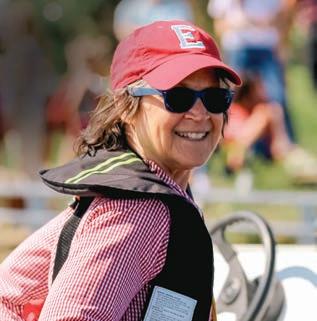
“Our relationship is really seamless,” Morris says. “We are two tough women who have the highest level of respect for each other. Our connection at Brooks tied us as friends before coaching together, but our relationship allowed us to really dive in and focus on doing what we love to do: work with and develop young people and really build this program.”
On paper, they might not seem like a perfect match. Morris was a high school athlete who excelled in feld hockey, basketball and softball, and she thrived in the physicality of those sports. Moore excelled as a dancer and sang in the choir throughout her childhood.
“Crew is like dancing on the water,” Morris says. “Once you are in the boat, all of your connection is spiritual. There is a grace, beauty, physicality and connectivity to the whole thing. You have to have incredible strength, balance and rhythm to make it work.”
An accomplished whitewater canoeist and kayaker, Morris might never have stepped into a crew shell if not for a broken toe that interrupted her freshman feld hockey
season at Trinity College. Moore, too, found rowing in college, joining the team at Radclife College to fll open time in her schedule, then fell in love with the sport.
“Sally and Becky are best friends and they worked well together,” says Albert Léger, chair of the Science Department and boys varsity crew coach since 2012. “Sally is a masterful technician who helped her crews use their bodies efectively and powerfully. Becky is methodical, patient and goal-oriented. She transformed students and knew how to empower girls into believing in themselves as confdent athletes.”
Although the goals for the varsity and junior varsity boats might difer, Morris and Moore complemented each other to reach a balance and rhythm for the program.
“Sally has an unwavering focus on everything that goes into speed,” Moore says. “She would look for these small, but major, adjustments on the varsity boats, fnding the perfect combination of rowers to jell in a boat — she could always fnd that.”
“Becky really prepared our students to be athletes,” Morris says. “By the time they were ‘graduating’ to a varsity boat, it was the foundation of her teaching that allowed me to focus on the technical profciency.”
The early-morning workouts that began at Brooks continued when the two reunited at Exeter, and coaching and teaching prep naturally became part of their exercise routine.
“We would build the workouts for the team and then go through them ourselves so we could know what the kids were going through,” Morris says. “We’d hop on the erg and mimic technical mistakes we were seeing and workshop strategies and verbiage on how we could help fx it. It was fun, and it helped us prepare both ourselves and our students better.”

Morris and Moore welcomed hundreds of students into the William G. Saltonstall Boathouse and prepared them for competition on the water that often extended well beyond Exeter.
“The boathouse and the team were my home away from home and a place where I felt encouraged to be unapologetically myself,” Molly Reckford ’11 says. She learned to row on New Hampshire’s Squamscott River, enjoyed a decorated career at Dartmouth College and is preparing for her second Olympics, the Paris Games this summer. “Coach Morris and Coach Moore held us all to a very high standard of integrity and self-management,” Reckford says, “and made it clear that diligent and consistent efort would pay of.”
While this spring season was one of change — new varsity coach, Peter Cathey, led the top two boats — the team’s successful results were familiar as they etched yet another mark of history into the record books.
The girls top eight boat (Ava Cathey ’25, Evie Gaylord ’25, Sophia Turner ’25, Ellie Ana Sperantsas ’24, Sophia Slosek ’25, Chloe Bosma ’26, Edie Fisher ’24, Amelia Post ’26, and cox Jane Park ’24) raced to a New England title and a top-10 fnish at the U.S. Rowing Youth National Championships.
Big Red fnished frst in the grand fnal of the New England Interscholastic Rowing Association (NEIRA) Championships on Lake Quinsigamond in Massachusetts. The winning time, 5 minutes, 14.02 seconds, topped second-place fnisher Deerfeld Academy by three seconds. This was the 12th New England title for Exeter’s top boat since 1994, three more than
any other school over the last three decades.
The victory at NEIRAs gave Big Red an automatic bid to the U.S. Rowing Youth National Championships in Sarasota, Florida. After a strong performance through time trials and the semifnal round, Exeter fnished second overall in the B Final with a time of 6:53.27 to claim tenth overall and was the second fastest high school eight in the nation.
“Sally certainly created an expectation of success for the program and I am fortunate that the girls love to row and want to go fast,” Cathey says.
Another tradition that was carried forth was the annual team celebration on the eve of NEIRA championships. “The results were going to be the results,” Moore says. “This was a true celebration of team and everything that goes into building one. Each athlete would draw a name and toast that person about what made them special. Over the years there were poems and songs written, even some sculptures from time to time. Those nights hold a lot of proud memories.”
“I remember those pre-NEIRA dinners with a lot of fondness,” Reckford says. “We would all get dressed up and it was a night that was about encouraging and celebrating each other.”
“Coaches Moore and Morris are Exeter Girls Crew,” Ellie Ana Sperantsas ’24 says. “When I think about the program, from the time I started as a prep until the day I graduated, no one embodies the spirit as much as they do. EGC is a sisterhood I feel honored to have been a part of and help lead as a captain. The bond is truly special and connects from the top boat down, across generations of rowers who understand each other.” E
First club crew season: ......................................................................................1971
First varsity season: ..........................................................................................1974 NEIRA course record: ........................................................................4:46.6 (2008)
2K Erg Record: ....................................................... 7:02.6, Holly Stevens ’11 (2011) Times received the E. Arthur Gilcreast Bowl for the best overall record ............16 Olympians: .............................................................................................................5
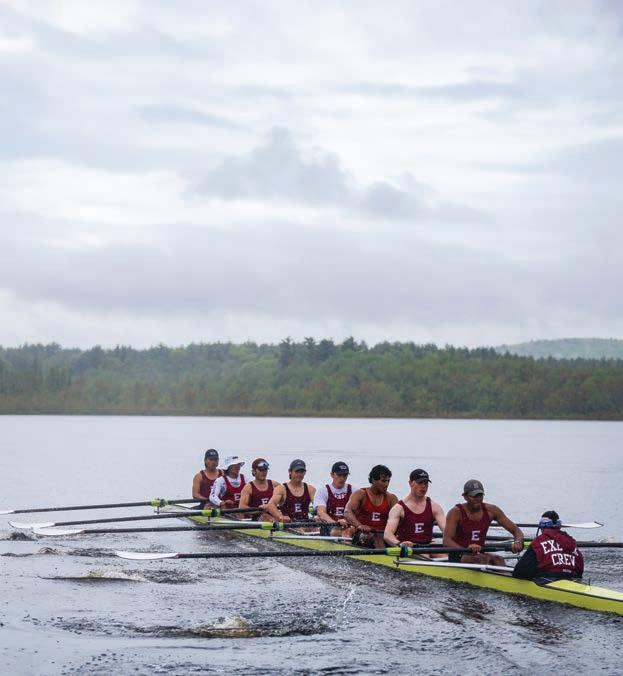

BOYS CREW
FIRST BOAT: FOURTH IN NEW ENGLAND
Head Coach: Albert Léger
Assistant Coaches: Steve Carr, Townley
Chisholm, Greg Spanier
Captains: Will Bernau ’24, Michael Goodall ’24
MVP: Rohan Radhakeesoon ’24
BASEBALL RECORD: 9-12
Head Coach: Tim Mitropoulos
Assistant Coaches: Dana Barbin,
Panos Voulgaris
Captain: Will Cooke ’24
MVP: Ryan O’Leary ’24

BOYS LACROSSE RECORD: 15-6
Head Coach: Bill Glennon
Assistant Coaches: Jim Breen, Travis Glennon, David Huoppi
Captains: Reid Burke ’24, Brendan Logan ’24, Baron Masopust ’24, Aidan Olazabal ’24
MVP: Aidan Olazabal ’24


GIRLS TENNIS RECORD: 5-5
Coach:
SOFTBALL RECORD: 4-12
Head Coach: Jen Boyden
Assistant Coach: Jack Gronau
Captains: Haley Alden ’24, Caroline Ciaschini ’24
MVP: Haley Alden ’24
BOYS TENNIS RECORD: 8-4
Head Coach: Ron Rodriguez
Captains: Kiran Raval ’24, Mitchell Tam ’24
MVP: Kiran Raval ’24

BOYS VOLLEYBALL
NEW ENGLAND CHAMPIONS RECORD: 8-0
Head Coach: Bruce Shang
Assistant Coaches: Suzan Rowe, Sophia Scola
Captains: Nicholas Lin ’24, Olisa Nwogugu ’24
MVPs: Nicholas Lin ’24, Olisa Nwogugu ’24

GIRLS CREW
NEW ENGLAND CHAMPIONS
FIRST BOAT: FIRST IN NEW ENGLAND, TENTH IN THE U.S.
Head Coach: Peter Cathey
Assistant Coaches: Diana Davis, Becky Moore, Maegan Moriarty
Captain: Ellie Ana Sperantsas ’24
MVP: Jane Park ’24
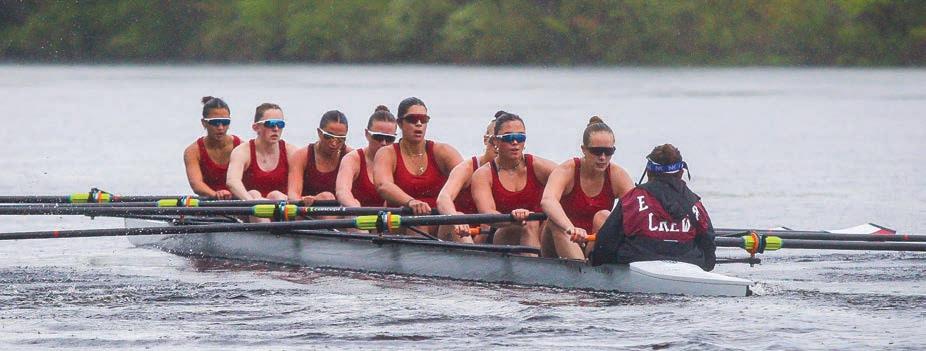
GOLF
PIPPY O’CONNOR GIRLS TOURNAMENT CHAMPIONS
RECORD: 7-3
Head Coach: Bob Bailey
Assistant Coach: Brandon Hew
Captains: Angelina Gong ’25, Michael Nardone ’24
MVPs: Angelina Gong ’25, Michael Nardone ’24
CYCLING NERCL CHAMPIONS
Head Coach: Don Mills

GIRLS WATER POLO
RECORD: 2-7
Head Coach: Meg Blitzshaw
Assistant Coach: Steve Altieri
Captains: Vedika Amin ’24, Sofia Contreras ’24, Mya Scott ’25
MVP: Vedika Amin ’24
Assistant Coaches: Kitty Fair, Jeanette Lovett, Jef Palleiko, Tim Whittemore
Captains: William Lu ’24, Leta Grifith ’25
MVPs: William Lu ’24, Luvy Danielson ’27

BOYS TRACK & FIELD
NEW ENGLAND CHAMPIONS
Head Coach: Hilary Hall
Assistant Coaches: Steve Holmes, John Hoogasian, Stephan Lewis, John Mosley, Brandon Newbould, Makhtar Sarr, Levi Stribling, Xiana Twombley
Captains: Cordel Epale ’24, Byron Grevious ’24, Will Simpson ’24
MVP: Byron Grevious ’24



GIRLS LACROSSE
RECORD: 13-6
Head Coach: Alexa Caldwell
Assistant Coaches: Kristen Kjellman
Marshall, Kerry Hausdorf-McBrearty
Captains: Amelia Byerly ’24, Esme
Shields ’24, Caroline Shu ’24
MVP: Caroline Shu ’24
PHOTOGRAPHS BY BRIAN
GIRLS TRACK & FIELD
SECOND PLACE IN NEW ENGLAND
Head Coach: Hilary Hall
Assistant Coaches: Steve Holmes, John Hoogasian, Stephan Lewis, John Mosley, Brandon Newbould, Makhtar Sarr, Levi Stribling, Xiana Twombley
Captains: Sydney Anderson ’24, Anna Kim ’24, Tenley Nelson ’24
MVP: Tenley Nelson ’24

STUDENTS ENJOY SOME
TIME - HONORED TRADITIONS
LEADING UP TO GRADUATION



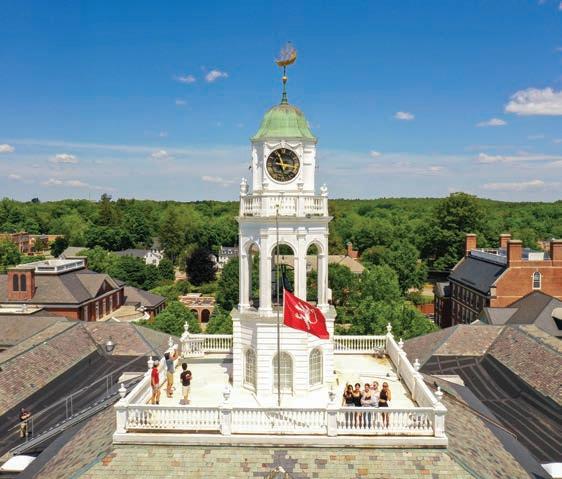

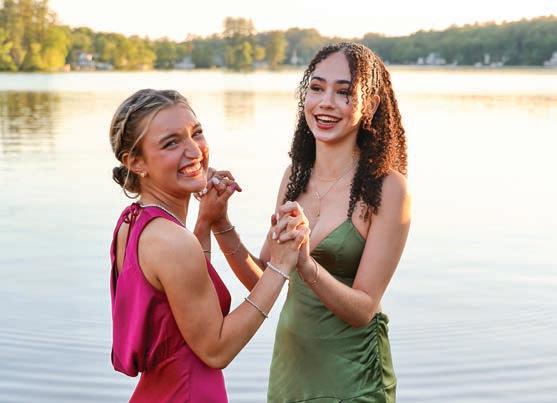
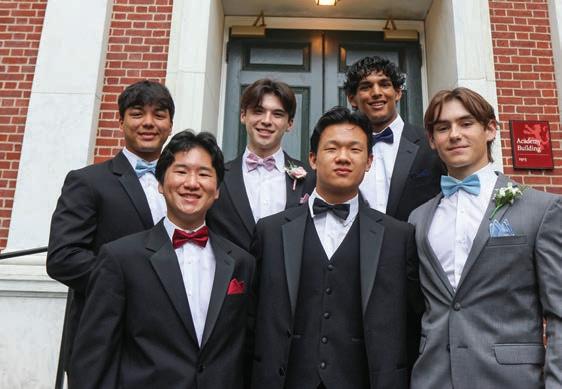






By Sarah Pruitt ’95
Parents, family members and friends gathered with faculty members on a brilliantly sunny Sunday in June to send of the class of 2024 in grand style. Accompanied by the elegant strains of a student string quartet, the seniors made their way across Front Street and up the center of the Academy lawn, followed by faculty members.
Ayaan Akhtar, president of the class, welcomed those gathered and his fellow seniors with a joyous, “Congratulations — we made it!” In his remarks he mentioned the challenges the classmates worked through together from the start of their time at Exeter in September 2020, deep into the COVID-19 pandemic.
“We attended our frst-ever classes scattered across the globe, staring blankly at a Zoom screen,” Akhtar said.
“We lacked the instant physical connection every other prep class made as soon as they stepped foot on campus
during orientation, yet we brought passion and an overwhelming desire to learn and love one another.”
Akhtar briefy paused his remarks in honor of classmate Matthew Clemson, who died last year. “Our class is incomplete without his presence,” he said. “He brought in irreplaceable light.”
He also spoke of world events, including the efects of climate change and armed conficts in various regions around the world. “Transitioning into adulthood brings a rising responsibility to use our education to recognize global adversity and its intersectionality,” he said. “Education truly is an extraordinary gift and an extraordinary luxury we have all been aforded, so it’s on us to use this gift as we become adults in a world full of injustices.”
Akhtar ended with a message of hope: “Let us continue to imagine, to dream. Let us utilize our immense curiosity and ability to envision and create a better world.”

Principal Bill Rawson ’71; P’08 recognized the retiring faculty members sitting onstage: Michelle Dionne, instructor in English; Mark Hiza, instructor in science; Becky Moore, instructor in English; and Russell Weatherspoon, dean of students and instructor in religion. Dana Barbin, former athletic director and a varsity boys hockey coach since 1987, also retired this year; the fve retiring faculty members represent a combined 162 years of service to the Academy.
Rawson opened his address to the class of 2024 by saying: “You came to Exeter to learn and grow, have fun, make lifelong friends, pursue your passions, and lay the surest foundation for the rest of your lives — the surest foundation for leading purposeful lives. You have done all that, and you have done it well.”
He lauded the achievements and accomplishments of the graduating class, whether academic, artistic, athletic or otherwise, as well as the deep friendships and lasting connections they formed. “I am proud of all that you have accomplished, but even more proud of how you have contributed to the life of the school, and how you have supported each other,” Rawson said.
As they enter the next phase of their lives, Rawson advised, the graduates will need to draw on the knowledge and values gained at Exeter, including the importance of listening to and learning from those with diverse backgrounds, experiences and opinions.
“It is all too easy in this world, and it may be all too easy in college, to surround yourself with persons who think just like you,” he said. “That might be a good way to fnd agreement, but it is not a good way to learn, and in fact can be quite limiting to your education. Learning with and from others whose ideas and perspectives difer from your own might seem hard at times, but it is the most interesting way to learn, the most fun way to learn, and the most efective and rewarding way to learn. In short, it is the best way to learn, and likely the only way to solve some of our world’s most intractable problems.”
During their time at Exeter, Rawson said, the seniors heard many alumni speak in assemblies about their experiences applying the core values learned at Exeter in work and life. With their graduation, they join that community of Exonians seeking to bring the values of goodness and knowledge to bear on some of the world’s greatest problems. “It is your turn now to begin writing your own non sibi stories,” Rawson said.
In closing, he welcomed the class of 2024 into the family of Exeter alumni with this assurance: “You will always be Exonians, and you will always belong here.” E



“YOU CAME TO EXETER TO LEARN AND GROW, HAVE FUN, MAKE LIFELONG FRIENDS ... YOU HAVE DONE ALL THAT.”
PRINCIPAL BILL RAWSON ’71
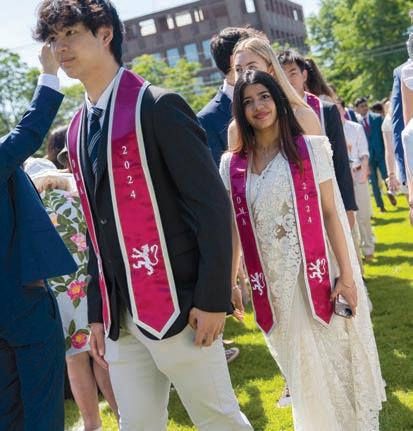

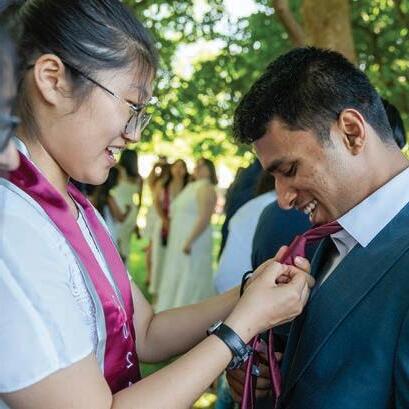
“LET US CONTINUE TO IMAGINE, TO DREAM. LET US UTILIZE OUR IMMENSE CURIOSITY AND ABILITY TO ENVISION AND CREATE A BETTER WORLD.”
AYAAN AKHTAR
’24


“LEARNING WITH AND FROM OTHERS WHOSE IDEAS AND PERSPECTIVES DIFFER FROM YOUR OWN MIGHT SEEM HARD AT TIMES, BUT IT IS THE MOST INTERESTING WAY TO LEARN.”
PRINCIPAL BILL RAWSON ’71


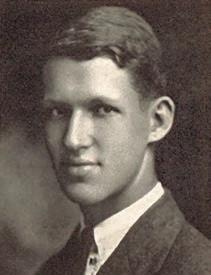
ON A GRADUATE FROM 100 YEARS AGO
William G. Saltonstall graduated from Exeter in 1924. Leonard Johnson ’56 shares a memory of the legendary man who served as Exeter’s ninth principal from 1946 to 1963.
“You know from William Draper’s portrait that hung in the Davis Library in my years, 1952 to 1956, ‘Salty’ looked like a quintessential Yankee,” Johnson writes. “He also had the accent to match. This was especially on display, with a tilt toward a Maine variation, when — every year at Chapel — he read us The Fastest Hound Dog in the State of Maine, by John Gould. Salty was also a terrifc athlete. He would arrive at the annual varsity versus faculty soccer match attired in a T-shirt, shorts and high-tops. He would then proceed to score a goal or two every year! During our time, he also started what we called St. Gurdon’s Day — a day of from classes usually during the February blahs. (Gurdon was his middle name.) He intended to lift our spirits, and he did. I recall putting on my skates for a jaunt on the black ice up the Exeter River. Finally, when he handed me my diploma, he said, ‘Thank you.’ Fortunately, I had the presence of mind to tell him that he had it backwards and that I should be thanking him!”


The Yale Cup, awarded each year by the Aurelian Honor Society of Yale University to that member of the senior class who best combines the highest standards of character and leadership with excellence in his studies and in athletics.
Byron Scott Grevious, Southport, Connecticut
The Ruth and Paul Sadler ’23 Cup, awarded each year to that member of the senior class who best combines the highest standards of character and leadership with excellence in her studies and in athletics.
Caroline Grace Shu, Westwood, Massachusetts
The Perry Cup, established by the class of 1945 in honor of Dr. Lewis Perry, eighth principal of the Academy, and given annually to a senior who has shown outstanding qualities of leadership and school spirit.
Nhan Phan, Nha Be, Ho Chi Minh City, Vietnam
The Williams Cup, established in memory of George Lynde Richardson Jr. and given annually to a student who, having been in the Academy four years, has, by personal qualities, brought distinction to Phillips Exeter.
Achyuta Rajaram, Hopedale, Massachusetts
The Eskie Clark Award, given annually to that scholarship student in the graduating class who, through hard work and perseverance, has excelled in both athletics and scholarship in a manner exemplifed by Eskie Clark of the class of 1919.
Adora Rose Perry, Warwick, Rhode Island
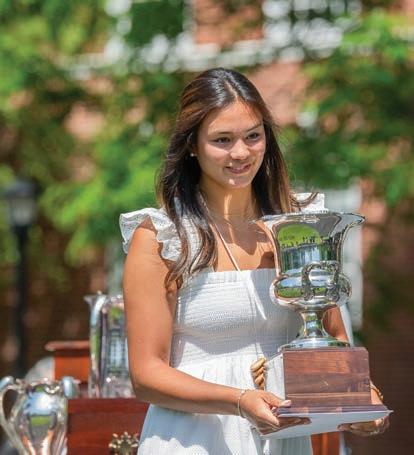
The Thomas H. Cornell Award, based on a vote by the senior class and awarded annually to that member of the graduating class who best exemplifes the Exeter spirit.
Gretchen Rose Lannon, New Castle, New Hampshire
The Multicultural Leadership Prize, awarded annually to the member or members of the graduating class who most signifcantly contributed to educating the community about, and fostering greater understanding around, topics of race, ethnicity, socioeconomic status, gender, nationality, sexual orientation, ability, religion, spirituality or other aspects of identity.
Ayaan Akhtar, Chicago, Illinois
Stacy Tianei Chen, Plymouth, Minnesota
Aliyana Cadence Koch-Manzur, Exeter, New Hampshire
Solu Uzodimma Ajene, Lake Forest, Illinois
Emelia Frances Zarb, Chevy Chase, Maryland
The Cox Medals, given by Oscar S. Cox, in memory of his father, Jacob Cox, are awarded each year to the fve members of the graduating class who, having been two or more years in the Academy, have attained the highest scholastic rank. In alphabetical order, this year’s medalists are:
Beeke Maria Fock, Lusaka, Zambia
Jack Walker Gordon, Princeton, New Jersey
Daria Ivanova, St. Petersburg, Russia
Emi Ogihara Levine, Hillsborough, California
Luca Cyrus Shakoori, Newport Beach, California
The Faculty Prize for Academic Excellence, given to that member of the graduating class who, having been two or more years in the Academy, is recognized on the basis of scholarship as holding the frst rank.
Jack Walker Gordon, Princeton, New Jersey



By Sarah Pruitt ’95
The picturesque Vermont city of Vergennes sits along the shore of Otter Creek, some seven miles upstream from where it empties into Lake Champlain. On a sunny day in late spring, a visitor can spend a pleasant while exploring the historic town center, with its refurbished Victorian-era opera house, nationally recognized ice cream shop and small but verdant City Park, among other attractions. Take a short drive down Main Street and across the creek and you come to a modest three-story building painted white. You’ve arrived — ideally thirsty — at the headquarters of Lost Lantern Whiskey, a leader among the growing number of independent bottlers of whiskey in the United States.
Started in 2020 by Vermont native Nora Ganley-Roper ’04 and her husband, Adam Polonski, Lost Lantern picks up on the Scottish tradition of independent bottling and reinterprets it in a distinctly American style. The company buys barrels of whiskey from diferent distilleries to resell under its own label, either as single-cask oferings or as blends.
“We want to bring this model to the U.S. in a really defnitive way,” Ganley-Roper says while standing at the warm blond wood bar in the tasting room at the front of Lost Lantern; the production facility is at the back. Behind the bar, bottles flled with liquor in hues ranging from light maple syrup to deep amber refect the sunlight. “There are other people starting to do it,” she adds, “but we want to be on the forefront of defning what the independent bottling tradition looks like here.”
Ganley-Roper grew up just 13 miles from Vergennes, in Middlebury. She came to Exeter as a new lower, fulflling what had become something of a family tradition. Her mother, Barbara Ganley ’74, was one of the frst four-year female students to graduate from Exeter; her maternal grandfather, Al Ganley, taught history at the Academy from 1964 to 1986. At Exeter, Ganley-Roper played violin in the orchestra and studied dance with longtime instructor Linda Luca. She also took every physics class ofered. “In my very advanced physics classes, I was average, but then you realize later, once you leave, that average for Exeter is actually exceptional,” Ganley-Roper says.
After graduating from Barnard, she worked in fnance for several years before parlaying her love of wine into a job at the premier New York City retailer Astor Wines & Spirits, where she rose to become a sales manager. Later, she honed her business acumen working at two start-ups in New York City. “I love building,” she says. “I love the process of creating processes and efciencies, hiring people and all of that.”
In 2018, Ganley-Roper and Polonski, a journalist and senior whiskey specialist at Whisky Advocate magazine, packed their belongings into storage and embarked on an eight-month road trip around the country. They visited more than 100 distilleries in a bid to explore the full landscape of American whiskey before founding their brand.
“We want to be on the forefront of defning what the independent bottling tradition looks like here.”
—Nora Ganley-Roper ’04



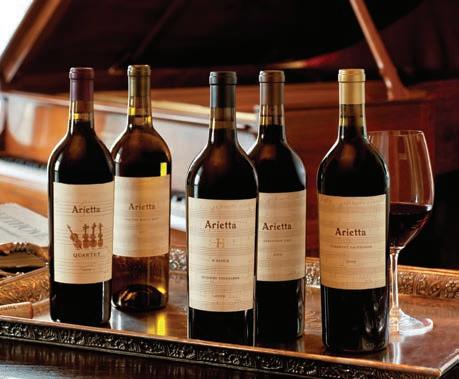
A key to the independent bottling tradition is transparency: The name and location of each distillery is listed on every bottle. Though good whiskey — particularly bourbon, a uniquely American spirit — has traditionally been associated with Kentucky and Tennessee, today roughly 2,600 U.S. whiskey distilleries stretch coast to coast, including Virginia, Colorado and California. Lost Lantern’s mission is to shine a light on the ones they believe are deserving of wider notice. The company works with more than 30 distilleries from about 20 states and is always looking for what’s new and noteworthy.
“Good whiskey is just the baseline of what we do,” Ganley-Roper says. “We also want to be able to talk about the people that make the whiskey, the climate where it’s made, the processes they use that might be unique to what they’re doing.”
Among Exonians, Ganley-Roper is not alone in making her name as an entrepreneur in the nation’s
“It’s that moment of great discovery, which is not just the sense of the wine itself, but ... the socialization that it provides.”
—Fritz Hatton ’72
growing craft alcoholic beverage industry. Whiskey in particular is enjoying a surge in popularity, with sales of American whiskey reaching $5.3 billion in 2023, according to the Distilled Spirits Council of the United States.
These are also boom times for smaller makers of wine, beer and other craft spirits. In such a crowded feld, the most compelling entrepreneurs are those who focus on creating high-quality products that refect who they are and what they value. They also succeed in blending an independent spirit with a deep connection to a community, and in creating — and articulating — strong visions and authentic stories behind their brands.
For Fritz Hatton ’72, the story behind his family-owned wine label, Arietta, combines his lifelong love of classical music with his pursuit of the heightened sensory experience and fellowship that sharing a great wine can bring.
The brand’s name comes from the Arietta movement of Beethoven’s Piano Sonata No. 32 in C minor, Opus 111.
“It starts with a very serene arietta, or little song, which is followed by four variations of increasing layering and complexity,” Hatton explains. “Finally, the last variation takes the arietta heavenward. … It’s almost nirvana, in the Tibetan sense of a place of expanded consciousness and enlightened pleasure.”
At Exeter, Hatton played the piano and the French horn; among his fondest memories are performing with the New Hampshire Symphony in front of his fellow students in Assembly Hall and conducting the Richard Rodgers musical The Boy Friend in one of the school’s frst coed drama productions. While in college, Hatton got a summer job helping a family friend open a wine and cheese shop in his hometown, Grand Haven, Michigan. He experienced a “wine epiphany” one humid night that summer, sitting on a porch overlooking Spring Lake and drinking a 1966 Corton Clos du Roi.
“It’s that moment of great discovery, which is not just the sense of the wine itself, but the sense of the socialization that it provides of bringing you together with people,” Hatton says. “Over the years, of course, one seeks to re-create that experience throughout life.”
In 1980, Hatton made the jump from wine retail to working at Christie’s, where he helped to establish the U.S. branch of its commercial wine auction program. As he rose in the management ranks, he also trained and worked as an auctioneer, eventually focusing exclusively on wine. By the late 1990s, he was one of the country’s premier wine auctioneers for both Christie’s and Zachys.
Through his friendship with John Kongsgaard, a longtime Napa winemaker and co-director of the Napa Valley Chamber Music series, Hatton got an opportunity he couldn’t pass up: the chance to create and bottle wine from a block of Cabernet Franc grapes on the Hudson Ranch, situated in the rolling hills and cooler climate of Napa’s Carneros District. Since that frst vintage was bottled in 1996, Arietta has become known for producing Bordeaux-inspired wines in the heart of one of California’s most prestigious winemaking regions.
“I grew up drinking mostly French wine for the frst 20 years of my legal drinking … so my palate is tuned to European examples,” Hatton says. “We try to make the wines a little bit brighter, more food friendly, not too massive, and that’s our style.”
Hatton and his partner, Caren, purchase fruit from the fnest vineyard blocks in Napa to make their Arietta wines. They have remained what Hatton calls “asset light” by not buying their own vineyards. “We’ve kept production to 3,000 cases, so it’s small and very personal,” he says. “We make wines to our taste, and we just have to fnd enough people who agree with our taste to buy the wine that we can’t drink.”
They’re in good company: Of the more than 11,000 wineries in the United States, 81% produce less than
5,000 cases annually, according to the nonproft Craft Wine Association. This small scale has allowed Arietta to fnd its niche, especially thanks to recent legislation meant to beneft smaller craft makers and businesses.
“It’s not easy,” Hatton acknowledges. “Family brands are largely disappearing in Napa because the costs are so high and the channels of distribution are shrinking. We’ve really been saved by the gradual changes in the laws of permitting direct-to-consumer sales in most of the states.”
In addition to its fagship red blend, H Block, Arietta’s portfolio has four other red wines — Merlot Hudson Vineyards, Cabernet Sauvignon, Quartet and Variation One — and one white, On the White Keys. The names, as well as the labels, refect Hatton’s twin passions and help tell the authentic story behind the brand.
“If you know wine, you’ll pay up to a certain amount,” Hatton says. “Above that, it’s all about the romance, the story, the people and the experience you had enjoying that bottle.”
Rich Doyle ’78 knows the efect that authenticity — and the willingness to take risks — can have in starting a successful brand. In 1986, he co-founded Harpoon Brewery in Boston with two friends from college and business school at Harvard. It was inspired by the drinking spots they had visited during summer travels in Europe.
“Communities really feel pride in and rally around their local breweries there,” Doyle says. “I got the idea of trying to start a brewery that would mean something to the local community, that people would come and visit and be part of.”
Although craft brewing is now a huge industry in the United States, Doyle had hit on something relatively new at the time, especially in New England: Harpoon received Brewing Permit #001 in the Commonwealth of Massachusetts. After producing its original Harpoon Ale in 1987, the brewery was soon introducing innovations such as the Winter Warmer, spiced with cinnamon and nutmeg, and the region’s frst India Pale Ale, or IPA, which is now a staple of the craft beer industry.
“I got the idea of trying to start a brewery that would mean something to the local community.”
—Rich Doyle ’78



“One thing that invariably comes up is focus. Don’t be mile wide, inch deep.”
—Rich Doyle ’78
Harpoon’s frst Octoberfest in 1990 drew some 2,000 people to their brewery. Since then, the crowds have only grown, displaying the community spirit Doyle envisioned. “At our beer hall in Boston, we used to get 2,100 people on Saturdays, and there was a line to get in,” Doyle recalls. “It became more than I ever thought it would, and it was a great experience.”
Doyle stepped down as Harpoon’s CEO in 2014 as the company, at the time the 12th-largest craft brewer in the United States, transferred to employee ownership. After more than 28 years, he was ready for a new adventure. “I did 25 Octoberfests, and we did fve events a year,” Doyle says. “I just thought, is the 39th going to mean that much to me? When you ask yourself questions like that, it’s time to go.”
His next venture, Enjoy Beer, aimed to partner with local craft brewing brands (like Abita, based in New Orleans) to consolidate costs and nurture their growth. The craft beer business had exploded: The Brewers Association estimates that as of 2023, 9,761 craft breweries were operating in the United States, representing about 24% of the U.S. beer market. With the knowledge gained from building a small regional brand like Harpoon into a national contender, Doyle knew he could help shepherd other independent brands through the growth process.
“There were all these small breweries popping up, and the big [beer brands] were starting to compete more heavily in the craft area,” Doyle recalls. “The idea was if you had a confederation of regional breweries, they could better defend themselves and prosper.”
Doyle worked on Enjoy Beer for a couple of years, but it ultimately proved difcult to build momentum. “The pricing got so bid up, we couldn’t conglomerate” other brands, he says. He’s now an investor in six companies, including Hero95, a beer company, and No Sleep Beverage, a holding company in the spirits and wine industry, in which he is also active. In addition, he teaches at the University of Canterbury in Christchurch, New Zealand, where he spends a month or two in the winter as an Entrepreneur in Residence.
Doyle’s advice to the brands he’s involved with now refects his years of experience in an ever-expanding, ever-changing industry. “One thing that invariably comes up is focus,” he says. “Don’t be mile wide, inch deep. Don’t go everywhere and not be signifcant.”
He credits Exeter for instilling the internal clock that allows him to continue to be as efective as he was in founding and running businesses. A four-year senior and varsity athlete and captain in soccer, basketball and lacrosse, he also learned a lot about teamwork, collaboration and competition. “What I always said to people in the beer business — we had a lot of athletes who worked at our place — is that it’s very much like a sport, except there’s no clock,” Doyle recalls. “Game’s on all the time.”
Back in Vergennes, Nora Ganley-Roper is behind the bar guiding a novice through an Intro to Whiskey Flight that showcases four types of single-cask whiskey: a Kentucky straight bourbon, a California straight rye and two types of single malt.
“The idea is that if someone walks in here and says, ‘I don’t know anything about whiskey,’ then they can walk out and be like, ‘I really like bourbon,’” Ganley-Roper says. “There are rarely opportunities to taste diferent styles of whiskey that are very classic next to each other.”
As the fight progresses from the classic rich favor of the bourbon through the bracing tang of rye and on to the single malts, Ganley-Roper ofers a dropper with some water to adjust the whiskey to taste. McCarthy’s Oregon Single Malt lingers the longest, with its distinctive smoky favor from the peat used to malt the barley. By way of contrast, a blend of single malt whiskies from Whiskey Del Bac in Arizona and Santa Fe Spirits in New Mexico substitutes mesquite wood for peat. The result, called Flame, was named the best American blended malt at the 2024 World Whiskies Awards.
Ganley-Roper and Polonski opened the frst bottle of Lost Lantern whiskey at their pandemic-delayed wedding in 2020, a small ceremony in the backyard of her parents’ house in Weybridge, Vermont. Since then, as the company has grown, they’ve taken their production facilities and bottling in-house and work with retailers that can ship to customers’ doors in 40 states. At the

tasting room, whiskey afcionados and newbies alike can choose from some 50 varieties.
After capturing numerous awards for individual whiskies, Lost Lantern won its biggest accolade in 2023, when it was named Independent Bottler of the Year at the global Icons of Whisky Awards, given by Whisky Magazine. Ganley-Roper traveled to London to accept the award at a gala celebration, taking her place alongside leading whiskey makers from Scotland, England, France, Japan and other countries.
At that very British occasion — the dress code was “lounge suit” — Ganley-Roper stood out. “I’m excited to be one of the few women because I think there is a lot of opportunity to bring in women to drinking whiskey,” she says. “I take a lot of pride in trying to be visible, and just have it be more normal that a woman owns or runs a whiskey company.”
Beyond ofering great taste, expertise and a passion for the product, any successful independent maker of whiskey, wine or beer must fnd an authentic way to connect with consumers and create a community. Near the end of the tasting, Ganley-Roper ofers one simple reason she believes Lost Lantern has been able to attract attention in a crowded craft spirit market.
“People buy our whiskey because they trust us,” she says. “I think that deep understanding of the place and the people and the process has been so much a part of building that trust.” E
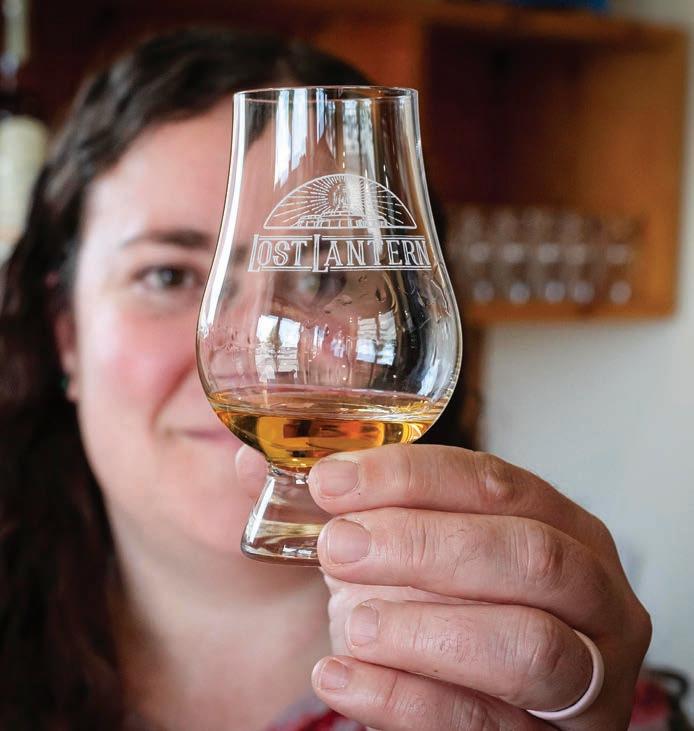

PETER BARTON HUTT ’52
By Sarah Zobel
It was milk that brought Peter Barton Hutt to Exeter, and it was milk that launched his career in food and drug law.
The son of a dairy retailer just north of Bufalo, New York, Hutt became an Exonian thanks largely to the foresight of H. Hamilton “Hammy” Bissell ’29. A legendary admissions director, Bissell made sure there was a place for the young “milkman” on campus, even though Hutt failed not only part of the entrance exam, but also one of three summer school classes he was required to enroll in. “I don’t know what he saw in me, but he changed my life forever,” Hutt says.
Hutt found Exeter academically rigorous and demanding, but he says that was precisely what prepared him for the rest of his life. “I could never have accomplished what I have done if I did not have my Exeter education,” he says. “I owe everything to Exeter.”
That trajectory took Hutt to the law frm of Covington & Burling in Washington, D.C., where he spent his professional life, save a four-year stint as chief counsel for the Food and Drug Administration in the early ’70s. At the FDA, Hutt created the now ubiquitous nutrition label, defned the systematic regulation of overthe-counter drugs, was responsible for legislation related to medical devices, promoted regulations to defne “imitation” foods, and brought the FDA into compliance with the Freedom of Information Act.
on a 1976 National Institutes of Health advisory committee that established guidelines for recombinant DNA technology.
At 89, he still teaches at Harvard Law School and is the lead co-author of the ffth edition of Food and Drug Law: Cases and Materials, which he has been co-writing since 1980, when only two law schools nationwide ofered courses addressing the subject. “I said we’ve got to do a casebook so we can elevate food and drug law to an academically respected and important area of law,” he says. “It should be taught everywhere in the country.”
Today it is — a professional legacy that delights Hutt.
Although he calls himself the “classic example of the law of unintended consequences,” there was a time when practicing law was not in his plans. His post-Exeter journey took him to Yale, where he joined the Navy ROTC and expected to serve in the Navy. An honorable discharge derailed that dream and he matriculated at Harvard Law. In his third year there, he says, his father began “pestering me with questions about food law.”
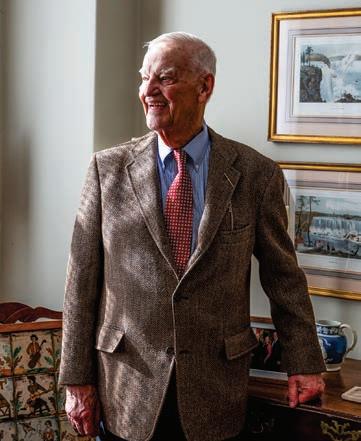
Fortuitously, Hutt saw a small written notice that the FDA’s chief counsel would be lecturing on campus, so he went in search of information for his father. The chief counsel ofered not only answers, but also a fellowship to an NYU master’s degree program to study food and drug law. “I always ask, where would I be and what would I be doing if I hadn’t seen that notice?” Hutt says.
“I had to begin the frst day overruling 100 years of FDA jurisprudence,” Hutt says with a laugh. “I just started dictating regulations day and night.” Getting things done is Hutt’s polestar: “I say, at least once a day, ‘Never say ‘no.’”
When he returned to private practice, Hutt, a father of four, added law professor and author to his lengthy curriculum vitae. It includes more than 100 appearances before Congress, 35 seats on biotech boards, election to the National Academy of Sciences’ Institute of Medicine, (now the National Academy of Medicine), and serving
He spent the year at NYU “having fun” researching English food and drug laws from the Magna Carta to 1800 before boarding a train in 1960 for D.C., where he began knocking on doors. One belonged to a partner at Covington & Burling, then home to the largest food and drug practice in the city, with a mere three lawyers in the feld. The partner, disdainful that Hutt hadn’t been on the Harvard Law Review, asked what he had done instead. “I said, ‘I published an 80-page article on federal milk marketing orders,’” Hutt says. “It turned out he knew a lot about milk marketing orders, but I knew more than he did. Four days later, I had the job ofer.”
Other than the FDA interlude, Hutt has been practicing food and drug law at Covington & Burling ever since. He says he’ll think about retiring when he hits 100 — his mother lived to 107, so he feels the odds are in his favor — but he’s in no rush. “Why would I want to go grow roses when I can continue to do things?” he says. “I hope I go as I am fnishing my last footnote.” E
By Danielle Cantor
In 2022, Margo Walsh ’82 stood on the Assembly Hall stage before a crowd of students and said:
“Consider this: You are the leaders. There is no one else who can be more qualifed to efect change — societal, institutional — beyond the students at Exeter.”
Walsh, a native of Cumberland, Maine, deeply believes this to be true. As the founder and CEO of MaineWorks, a stafng agency for formerly incarcerated people and the frst certifed B Corporation in Maine, she lives the non sibi credo every day. The responsibilities are many. The stakes are, at times, quite high. But Walsh has zero doubts about the work she is doing, or that her time at Exeter helped her arrive at this point.

“Developing a business to address a social problem was central to starting MaineWorks,” Walsh says. “Solving big problems is a very Exeter thing.” In 2009, Walsh became aware of the underemployment problem among the men at the pre-release center at Maine’s Cumberland County Jail, where she was a volunteer. The men were permitted to work in the community but faced low wages and limited options. Even fnding reliable transportation was a challenge.
Walsh had endured a personal struggle with addiction; she was at the prison to speak about recovery. A natural networker, she had built a successful career as a recruiter within the investment banking division at Goldman Sachs in New York City. She married and had two sons. From the outside her life looked fne, but through the years her drinking, which began in her teens, spiraled out of control. In December 1997, she entered a 10-day alcohol rehabilitation program.
More than a decade later, Walsh moved home to the Portland suburbs to raise her children. In 2010, she divorced,
was struggling to make ends meet, and looking for her next step. At the prison, she became determined to use her professional recruiting experience to fnd better jobs for the inmates and others like them.
“I’ve always wanted to help marginalized people,” she says. “I saw potential in the inmates. I also knew that no one would ever hire them because of their felonies, so I thought, I will.” In 2010, Walsh asked her sister, Elaine Walsh Carney, and another friend for a loan to start an employment company for felons and recovering addicts. They agreed, and several months later, MaineWorks opened its doors.
Why would this single mother of two put all her energy into a venture that immersed her in some of life’s harshest realities? How did she fnd the courage? Walsh believes her capacity for selfessness most certainly developed at Exeter. “The ethos of the institution just seems to permeate the psyche of people who have moved on from the school,” she says. “The ability to consider other people has always been my way in the world. Maybe you can call it codependence with a capital C.”
With the full force of her personal convictions behind her, Walsh networked and hustled to fnd employers who might take a chance on the new agency. “The construction industry basically hires on raw strength and hard work,” Walsh says. “I was able to provide people who were willing to show up with that work ethic and the social support they needed to really move on in life, and not just get stuck in perpetual exploitation.”
The MaineWorks mission is “working toward economic viability for each individual who is willing to work.” Companies, primarily in the construction and landscaping industries, hire the organization when they need temporary labor. But Walsh provides more than a job, she ofers a system of support for her workers that sets MaineWorks apart from other stafng frms.
It all begins with “morning circle,” a daily meeting at which workers receive job assignments, meet new employees and share updates. The ritual allows the workers to unload, or celebrate, without judgment as they navigate life after incarceration. Circle used to take place in a 7-Eleven parking lot; now it’s held beside the MaineWorks building.
After circle, Walsh and her team drive workers to job sites across the region. MaineWorks provides all required safety equipment, plus new coats, boots and other gear to ensure they are properly outftted.

Instead of being paid only if they receive an assignment, as many temporary workers do, the men and women at MaineWorks receive weekly paychecks.
Almost immediately, MaineWorks’ client base grew, and those companies began hiring its employees for fulltime work — regardless of their background. As the workers returned to circle each morning, they revealed the struggles that had defned their past. A former baseball star had major league potential until he was arrested for stealing wine. Now sober, he went on to start a family and coach sports for his three sons. Another man had survived the Rwandan genocide as a child and came to the U.S. as a refugee. After struggles with addiction and an arrest, he was in recovery and raising a daughter with his wife. Each person was building something new, a source of pride.
In 2013, MaineWorks obtained its B Corp certifcation from the nonproft organization B Lab. The process involves a rigorous assessment of the company’s adherence to social and environmental metrics. “It’s wicked hard,” Walsh says jokingly, but it is clear how much this achievement means to her. The designation elevates MaineWorks into a rare echelon of for-proft companies driven by accountability, transparency and high hopes.
After several years in operation, Walsh realized the workers needed more and diferent types of support to succeed. In the early stages of recovery, simply living is complicated and everyone’s needs are unique. “It’s one thing to say, ‘I need to get my license back,’” Walsh says. “But you need to go further upriver and fgure out, how did they lose the license in the frst place? Did they ever even have a license? For most people, we follow a linear path. But for people on the margins, linear is not a path.”
In 2017, Walsh and her sister formed the United Recovery Fund, a nonproft organization that raises money to support clients in their reentry into the workforce. “Think about people who have no money,” Walsh says. “They don’t have $300 for license reinstatement. Rent assistance — who has frst and last months’ rent, plus security? No one. We put our heads down to get underneath that messiness.” Last year the fund raised $800,000 to provide essentials like housing, transportation, health care, work clothes and gear for the workers.
Today, MaineWorks employs a workforce of 80 people and counts 15 large industrial construction companies in northern New England as clients. Its leadership team includes several key members who began as laborers and rose through the ranks — further proof of its power to change lives. Though Maine remains the headquarters, the company has established operations in New Hampshire and Massachusetts using a hub-and-spoke model. It has plans to expand into Florida.
The “work” of MaineWorks will never be complete, but Walsh remains up to the challenge. “I have a tireless ability to make and maintain connections,” she says. “I just have an unbelievable capacity for people. I have no idea how. It’s exhausting, really!”
So much can and will change, but through it all Walsh and the MaineWorks circle will be there, ofering jobs, encouragement and support. “We meet every Friday at 6 a.m. on Forest Avenue,” Walsh says. “There is always cofee — all are welcome.” E
We asked for your thoughts, and you responded en force! We heard from more than 3,000 alumni of all ages, from diferent backgrounds, from all around the world. The survey produced a lot of positive feedback and gave us some ideas for ways to serve the community even better. Here are a few key fndings. Thank you for your participation!
ALUMNI FEEL POSITIVE ABOUT EXETER
92% believe it was a good or great decision to attend Exeter
88% have a good or excellent opinion of the Academy 72% believe they are having a good or excellent experience as an alum
While all of Exeter’s core values resonate with alumni, on a scale of 1 to 10, academic excellence, knowledge and goodness, and non sibi resonate the most.
Academic Excellence
Knowledge and Goodness Non sibi
Youth From Every Quarter
Youth Is the Important Period
Most likely to promote Exeter, compared to all decades
Most likely to update contact information to stay in touch with Exeter
The leadership of the principal significantly affects the overall perception of Exeter
Eager to hear about institutional priorities and messages from the principal
Motivated to attend Exeter reunions
Overwhelmingly feel that attending Exeter was a good decision
Largest respondent group from the entire survey
Motivated to attend events to see fellow classmates
Interested in hearing about faculty news and achievements
A majority of you feel Exeter prepared you well for:
Attending college
Being adept at work
Living a purposeful and meaningful life
Working well in diverse groups
Contributing to your community
The top five skills you feel you gained from Harkness learning:
1 / Critical thinking
2 / Effective oral communications
3 / Active listening
4 / Problem-solving
5 / Creative and innovative thinking
Learned to think critically at Exeter
Academics were the most critical contributor to the overall student experience
Eager to hear about news and achievements of fellow alumni
73% of alumni feel that the frequency of communication from Exeter is about right
You want to engage more with Exeter and suggested that we:
Enhance communication and transparency
Diversify experiences with more inclusion
Offer more non sibi activities for alumni
Provide networking opportunities with other alumni We connect with you often enough and you love reading The Exeter Bulletin.
You enjoy attending reunions and seeing fellow Exonians in your area.
60%
are likely to attend Exeter reunions
55%
are likely to attend Exeter events in their region
80% of alumni rely on The Exeter Bulletin for news and information about the school
You want to hear about:
Alumni news and achievements
Institutional priorities and messages from the principal
Student and faculty news and achievements
Campus life
We value your feedback and we’re listening! We thank you for your support as we work to enhance and strengthen alumni connections to each other and to the Academy. This year we plan to:
Increase communications about campus updates and the student experience
Provide opportunities to network based on industry
Read emails more than any other alumni group
Academic excellence critically affects overall impression of Exeter
Feel Exeter prepared you well for being adept in the workplace
Highlight alumni news on social media (follow us @pea_alumni)
Organize diverse regional events including non sibi activities and faculty-led discussions
Relationships with other students were an important part of Exeter experience
Welcome opportunities to mentor current students or alumni
Interested in attending regional events
Offer mentorship opportunities with students
To ensure you don’t miss out, update your contact information at exeter.edu/recordupdate.
Harkness learning and depth and scope of course offerings highly influence the current perception of the school
Inclined to attend Exeter events
Read the monthly alumni newsletter
Strong preference for receiving Exeter news via social media
Of Exeter’s core values, non sibi resonates most
Occasions to explore student leadership opportunities were important to the Exeter experience
Norval Rindfleisch was described as highly intelligent, well educated, impatient, ambitious, candid, good with people, interesting, full of wit and humor, opinionated, loyal and self-reliant. A boarding school instructor of English for 42 years, Norval taught with purpose; he believed, “We must enter each class with an enthusiastic commitment to the usefulness of the hour, a concern for our students and a love of what we teach.”

Born on April 2, 1930, in Los Angeles to Adolph and Lillian Nolan Rindfeisch, Norval was raised primarily in South St. Paul, Minnesota, where he attended Cretin High School and started college at the University of Minnesota. After serving in the U.S. Coast Guard from 1950 to 1953, Norval married his beloved wife, Carol Olsen, in 1954 and returned to his studies — frst at Long Beach City College and then at the University of Chicago, where he earned a B.A. in 1957 and an M.A. in 1958. A member of Phi Beta Kappa in 1957, Norval was also named a Woodrow Wilson National Fellow. From 1958 to 1968, he taught at Pomfret School where he chaired the English Department, coached varsity football and lived in the dorm.
Colleagues and friends later noted that a portrait of Norval would be incomplete without saying, as one department member wrote, “His one frivolity, and it was an intense one, was golf.” In fact, Norval frst met future English Department colleagues Charlie Pratt and Dick Niebling when playing golf — and thus considered teaching at Exeter. Joining the faculty in 1968, Norval taught English with a particular focus on writing. Upon his retirement in 1990, Principal Kendra Stearns O’Donnell wrote, “In his long career … Norv proved himself to be a master of both the theory and practice of the teaching of writing; his interest and expertise have shaped this critical element of an Exeter education.”
A former student recalled that “his skill as a writer was inspiring — his grace, wit and reverence for the writer’s craft was the … most important thing that made me a writer. He single-handedly changed the trajectory of my life.” No doubt part of that inspiration came from Norval’s directive: “We must celebrate each day the concrete word, the sacred whatness of revealing detail, the glory of the simple sentence.”
Beyond the Exeter classroom, Norval coached football and worked on numerous committees including Appointments, Educational Policy,
Dormitory, Faculty Workload, Lamont Poets, Interdisciplinary Writing, Advanced Placement, Athletic Workload, Bennett Fellow and Graduate Student Procedures; on the latter four committees, Norval served as chair. From 1970 to 1996, Norval also shared his knowledge of literature and secondary school teaching by giving over 20 papers, presentations and workshops to schools and community organizations.
Norval lived in Webster Hall and Dow House, before serving as dorm head in Wentworth Hall and then Williams House. During those years Norval and Carol’s four children attended the Academy: Mary Frances ’73, Julie Ann ’77, Katherine Nolan ’81 and Joseph Karlstad ’84. The family spent the 1977-78 school year in Rennes, France, where Norval taught at School Year Abroad. In 1984 Norval served as the resident director of the Washington Intern Program. In 1986-87 he took another year away from Exeter to teach at Episcopal High School in Virginia, where he won the Best Teacher Award.
The Academy and others also recognized Norval’s work in several ways. Appointed Lewis Perry Professor in the Humanities in 1981, Norval was then chosen as one of the frst recipients of the Brown Family Faculty Award in 1985. In 1986 the University of Chicago awarded him a citation for excellence in teaching, echoing the Scholastic Magazine/Smith Corona Award of 1980 that was given to three teachers nationally. In 1989, as he planned his retirement, Norval wrote to the Dean of Faculty: “It is time to move along and spend the rest of my life working at my frst passion — writing — or rather rewriting as is more often the case with me.” Starting in 1964, during all those years of teaching, Norval published fction, with short stories appearing in many journals and anthologies; his work was recognized with an O. Henry Award in 1970. Norval’s frst book, In Loveless Clarity and Other Stories, was followed by four more in 1980, 1995, 2000 and 2001. Norval also continued to share his love of words and writing with students in states including Louisiana and South Dakota.
In celebration of the Academy’s bicentennial in 1981, Norval was asked to write a curriculum statement which became the essay, “Seminar Teaching and the English Curriculum.” In this piece, later republished by Independent School, Norval explained the power of Harkness teaching and personal writing. At the close of the essay, he quoted Dostoevsky: “Have faith in the self-correcting powers of the human soul.” With that line Norval reminded teachers that “we must allow the process of self-correction to take place” both at the table and on paper. He concluded, “If we do, our students may then realize a self-sustaining grace of style and intellect to go their own ways.”
Norval Rindfeisch died at age 84 on Jan. 5, 2015, in New Milford, Connecticut. E
The Memorial Minute excerpted here was written by Instructors in English M. Rebecca “Becky” Moore and Brooks Moriarty. The full remarks were presented to the faculty at its meeting on April 15, 2024, and are available at exeter.edu/ memorialminute.
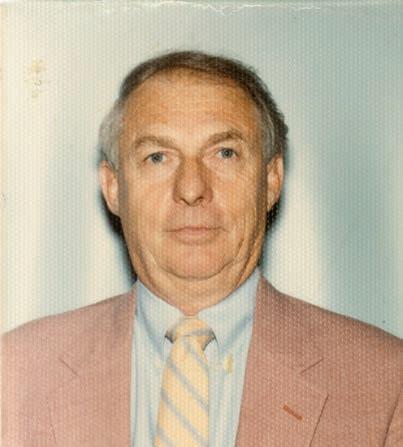
“We must celebrate each day the concrete word, the sacred whatness of revealing detail, the glory of the simple sentence.”
By Anushka Noori ’26
The wafting smell of jalebi soaks the surrounding air in a stifing warmth. My mother’s hand is grasped frmly in mine, tightly enough to eliminate any space between our pressed palms as we scurry between the throngs of people bustling along busy Sutar Chawl. An oncoming cyclist squeezes between a moving blue semi-truck and the muddy plaster buildings that line the road. Vivid colors are strewn across crammed stalls selling used cellphones and stationery. Their awnings provide a safe haven from the sweltering heat that beats down upon the wide marketplace and soaks my skin in sweat. My American-made jeans are glued to my body, and I shift uncomfortably. I should have borrowed my cousin’s kurti when she ofered. Stores advertising sarees and dupattas are painted in safron red. Rust-ridden shutters are secured to splintering beams of wood, worn from overuse. Competing shouts of “Rickshaw!” and “Garam chai! Garam chai!”,1 the distant tune of 1970s Bollywood music, and the undercurrent of rustling cotton fabric as people slide past one another consume the remaining empty air. Not yet having mastered how to navigate through the rushing current of people that surge from both ends of the street, I barrel indelicately into a roadside vendor selling fresh pav bhaji, unwillingly surrendering the safety of my mother’s grip.
“Dekh nahin sakti, kya?”2 The man barks at me. I feel the heat of his gaze blister my skin, his blazing irritation matching the intensity of the coals burning under the tava. My face foods with color, the same shade of safron red that paints the store signs. I scurry to the side. My voice is gagged by an invisible dupatta woven from the curious judgment of onlooking passers-by. I wait in trepidation, an impostor Indian within the horde of a hundred others who look just like me, for someone to ask, “Angrezee?”3
My tongue betrays me. The clear-cut English consonants that my mother so persistently taught me in the early years of my learning — then a marker of my parents’ successful immigration to the United States — are now holding me hostage. To my dismay, the guttural sounds that Hindi demands are not ones that feel familiar. In the comfort of the bedroom that I dwelled in for the duration of our stay in Mumbai, I stare into the streak-stained mirror and stubbornly mimic the gh’s and sh’s that are shouted across Sutar Chawl. I watch as my lips duplicate the movements I memorized in the market. My vocal cords answer with misplaced emphasis, misguided conjugation, and muddled uncertainty.
Back home, I still sing ghazals in Urdu to the audience of tiles in my bathroom and mutter teasing remarks to my brothers in Hindi. Yet, the same guttural consonants — the kh’s and gh’s — tossed efortlessly around Sutar Chawl clash with the strict, unyielding articulation of my high school Spanish classroom. The deep, soulful sounds that I use to describe the sugar syrup dripping of of hot jalebi or the weight of ornate, braided threads of red and gold in my grandmother’s dupatta collide with the sounds of Spanish, a language rich with stories of two famenco dancers circling each other in a midnight courtyard festa, or of the smell of brine and the spray of the open sea as a fotilla of conquistadores explore brave new worlds, or of a father’s pride as he drizzles vinegar and sprinkles salt over the last batch of his family’s secret gazpacho recipe. The accents that I carry with me into classrooms and those I replace within the comfort of my home conjoin to construct their own language, one resonating with forgotten adventures, buried memories and generational growth. The language of my people, the language of our shared past, the language that my family carried in their suitcases, and the language that I am gifted in the Spanish classroom all at once clash and harmonize into something else entirely. Alone, I can claim none of them; together, I call them all my own. E
Editor’s Note: For this story, Anushka Noori received the distinction of First Class in the 2024 National Council of Teachers of English Achievement Awards in Writing contest.
1. “Hot tea! Hot tea!”
2. “Can’t you see where you’re going?”
3. “Foreigner?”

October 18-19, 2024

Come visit the Exeter student in your life this fall and share in the richness of their Academy experience. Program details to come!
Why not extend your stay? There are no classes on Monday.
PHILLIPS EXETER ACADEMY
20 Main Street
20 Main Street
Exeter, NH 03833-2460
Exeter, NH 03833-2460
Recipient:
Parents of Alumni:
If this magazine is addressed to an Exonian who no longer maintains a permanent address at your home, please email us (records@exeter.edu) with their new address. Thank you.
